#These are very explicitly character flaws of his. (He even agrees about the 'not listening' part at the end of 4x14 rip)
Explore tagged Tumblr posts
Text


Macaque: "You did it for yourself! You've become like this, obsessive demon! I told you going against the Jade Emperor was a bad idea, but no, Wukong doesn't listen to anyone! He just does whatever he wants! You put yourself here, not me."
(4x11 A Lifetime of Mistakes)
-

Macaque: "Still the same Wukong—doing whatever he wants with no regard for others!"
(3x14 Destiny Fulfilled)
-

Macaque: "You're really going through with this?" Sun Wukong: "Correction! We're really going through with this! Like always! Monkey bros getting up to some cheeky mischief!"


Macaque: "Look Wukong, I get you're excited, I do! But- crossing the Jade Emperor's going to have consequences—aaannnd you're not even listening."
(4x02 New Adventures)
-


MK: "Ah! The path of the good guy! Makin' those good life choices?" Macaque: "Every choice has consequences kid—for someone."
(4x11 A Lifetime of Mistakes)
-
Not listening to anyone has it's consequences!
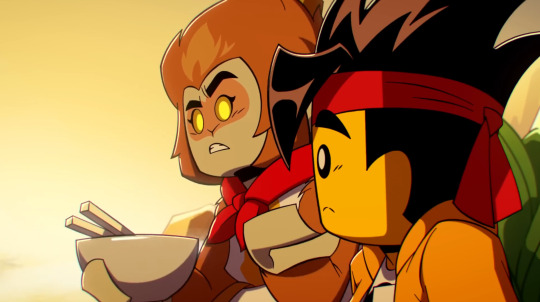
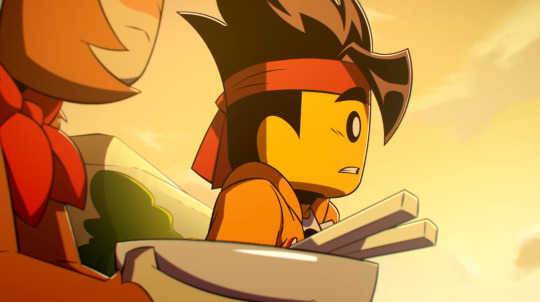
Sun Wukong: "I know I can never make it up to you. Honestly, I- I never thought I'd live as long as I have let alone be someone's mentor—turns out I'm not very good at it. I guess what I'm trying to say is...I'm sorry MK. For all of it." MK: "It's okay—I can always get another bowl of noodles."
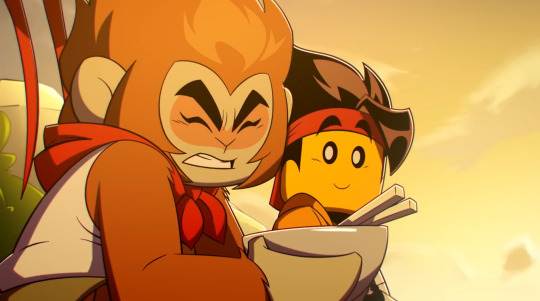
Sun Wukong: "Wha! No! Not the noodles! Ugh! I mean, I'm sorry for being a bad mentor and making you clean up after my mess!"
(3x14 Destiny Fulfilled)
-
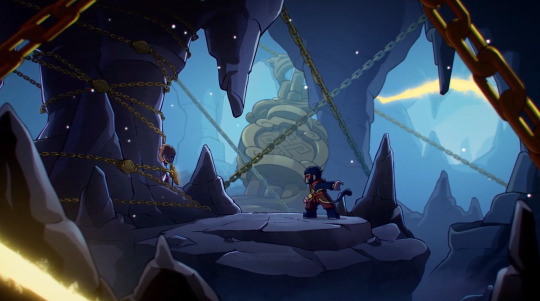
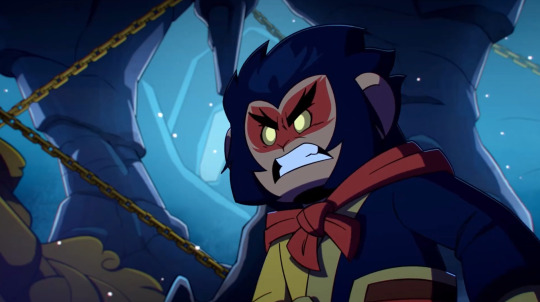
Macaque: "No that's YOU! You're the one always running off! Looking for more power, more sources of immortality—you're the one who wouldn't quit while were were ahead! Not the great sage, he's got to drag EVERYONE else into his mess!"
(4x11 A Lifetime of Mistakes)
-
Wukong's Messes.
#the fact that people don't think Wukong dragged Macaque into fighting the celestial host surprises me#I definitely do. And absolutely because of the MK parallel but also because#Like. Wukong's whole motivation for facing the Jade Emperor was to become more powerful/immortal. Straight up#It wasn't as noble as Azure or Yellowtusk's goal#So like. 'You did it for yourself!'. Methinks that's pretty accurate#But I also think the Brotherhood/Macaque were not required to help release Wukong#Like. One: I don't think they even *could* and two: they already lost against heaven. What would freeing Wukong do#Anyways Macaque wasn't wrong for not releasing Wukong. This is my hot take#Like ''Wukong was on a path of self-destruction'' yeah.#IDK I think pre-jttw Wukong sucked (affectionate)#Like there were no angels. Macaque also sucks (affectionate)#But Wukong did some stuff. Like. I think SWK was the one in more wrong during shadowpeach's 4x11 fight#But my interpretation is that pre-jttw SWK hurt Macaque more and then during/post-jttw Macaque hurt SWK more#if that makes sense#Other folk don't think that and that is okay! It's totally valid and good and we'll have to see where canon goes#But it does grind my gears when people assume certain things are fact/canon when they aren't#Like Macaque was totally right in his 4x11 speech.#Wukong really doesn't listen to anyone. He really does just go off to do whatever he wants with no regard for others.#These are very explicitly character flaws of his. (He even agrees about the 'not listening' part at the end of 4x14 rip)#And like. SWK tries desperately to regard others but he is so so so so bad at it#And I respect his attempt. Unfortunately he ends up hurting the people he cares about anyways (sorry Wukong)#(This is your tragedy and it's really sad) (I love you though)#Sorry I don't want to demonize Wukong here I just don't have as many thoughts on Macaque asdfadsf#He's like. A weirdo. Did some fucked up shit to MK. I don't know what he did to SWK yet but it was bad#(like other than leave SWK under the mountain which from SWK's perspective is a solid reason to dislike Macaque)#Gaaahh WE JUST DON'T KNOW STUFF MAN#lmk parallels#lmk#lego monkie kid#lmk speculation
312 notes
·
View notes
Text
I really don't hate Kit but his fans don't do him any favors by acting like Jentry kissing him once, figuring out he's been lying the entire time he's known her and then not being interested in starting to date this new version of him she doesn't really know is a sign that Jentry is being written as especially flawed or the writing of the show is bad.
I think it's true that Jentry is overly concerned with appearing normal but I also don't think she owed Kit anything up to and including the kindness she did show him.
I don't think Jentry dangled the possibility of getting back together in his face, i can see (maybe) why he thought so at first but she's so clearly uninterested and wary of him in the scene where she proposes they work together because from Jentry's perspective she is talking to a stranger that had been lying to and stalking her.
She gave him a chance to make up to her that he was part of a murder plot with her as the intended victim. That's all. Forgiveness is not the same as romantic interest and she only offered him the former.
Jentry tried to be friendly but even during the mission to steal the robe Kit is already overstepping. Implying things to Gugu about him and Jentry, rejecting Michael on Jentry's behalf even as she is listening to him and explicitly telling him she would say yes?! Like I'm sorry but if Kit was only doing this so they could get back together the Michael mum scene was a flashing neon sign that Jentry was not offering that. She's not being unclear or hiding her interest in Michael, she is literally shouting it in Kit's ear.
Jentry ended up dating Michael and he has powers but apart from her eventual relationship with Michael showing how Jentry has grown as a character and learned to embrace both her powers and that her life will never be normal - Michael despite his own flaws is a) a person Jentry knows and trusts and b) very upfront with Jentry about the visions. As soon as he figures out the visions are real he tells Jentry. Michael's powers also have absolutely nothing to do with Jentry- Kit being a face painting demon is not because of Jentry but him hiding that he's a face painting demon is a direct result of him being part of a conspiracy to kill her! It's not like he happens to be a face painting demon who already lives there. Seducing and Killing her is Kit's entire reason for coming to town in the first place!
Also Michael takes no for an answer. After Kit rejects the mum on Jentry's behalf (against her explicit instructions not to!) Micheal doesn't try and convince Jentry that she's wrong for rejecting him. Michael always backs off when Jentry pulls away even though she is clearly and consistently romantically interested in him.
I don't think it's Kit's fault that he's isolated and bad at reading signals. I do think he made a lot of assumptions starting from immediately after the kiss because again they don't even agree to start dating before he pulls away and then she learns that he was lying, but somehow he expects that they're going to jump into a relationship after they steal the robes.
I also don't think it's Jentry's responsibility to work overtime to understand things from his perspective when he's being pushy and ignoring the very clear signs that she is interested in Michael and also I can't emphasize this point enough- he moved to town and spent months lying to her face specifically because he was an agent in a plan to kill her. I don't care how or why he changed his mind -that's enough reason for Jentry to have thrown his ass in the portal directly after the fair.
#I understand that in a lot of stories the point is that the protagonist learns to look past appearances and yada yada yada#That's fine but the thing under Kit's appearance is a person who came to town to murder Jentry#Kit created the trust issues he encountered from Jentry because of his decisions#Jentry chau#jcvtu spoilers#Kit critical#Jctvu kit critical#Jentry chau kit critical#jentry chau spoilers
13 notes
·
View notes
Text
Cheers to all the people reblogging that tragedy post for being extremely civil and reasonable by comparison to the usual Tumblr experience of going lowkey viral. You're all excellent human beings.
Since I'm currently moonlighting as a tragic fiction defense blog, however, I do want to indulge in some mostly good-natured grumbling based on major themes in the notes:
1. This is not actually why I hate tragedy - Listen man, I did explicitly say "one reason" people dislike tragic fiction, not "The Reason."
2. But poorly written tragedy is awful - So are poorly written happy/triumphalist endings! They can even (speaking as someone with trauma-adjacent flinch responses to certain things that Tumblr often describes as "soft" or "wholesome") be extremely painful to read, at times. Bad fiction is allowed to exist and you are allowed to criticize it accordingly without that badness being treated as a reflection on the entire genre to which it belongs.
3. Tragedy is not my cup of tea because real life is hard enough/stories that make me feel doom and helplessness are unhealthy for my depression/I'm too empathetic to handle characters suffering/etc - (a) You're super valid and I super support you but also (b) your experiences are not universal. To their great credit nobody in the notes has said this, but I have encountered FAR too many people on this website confidently claiming that only someone who has never faced hardship, and/or someone thick-skinned and unfeeling toward others' pain, could possibly enjoy tragedy. As a person who has in fact faced hardship and who cannot even squash spiders because it makes me feel too guilty, I personally resent this.
(When I was depressed tragic stories reminded me that flawed people who failed were still worthy of compassion, so y'know. People process their experiences differently and that's okay.)
4. Some authors use tragedy to punish the reader for caring about the characters and 5. Griping about ASOIAF/GOT, which I am choosing to address together because they are so frequently mentioned in the same breath - Okay. Rant incoming but while I have many complaints about ASOIAF (in fact I quit reading midway through) and even more about GOT (which I quit watching even earlier), I'm extremely tired of hearing people accuse GRRM of being a cynical edgelord merely because a lot of his characters die. Maybe it's just conflation of the TV show's poor execution with the writing itself, but I constantly encounter people framing the series' numerous deaths as a kind of Gotcha punishment (why are people so hung up on tragedy-as-punishment?!) for the audience for being naive enough to get attached and/or have hope - an admonishment that life is unfair and you should get used to it and if you're sad it's your own fault for caring too much.
#1, Martin has many flaws as a writer but failure to get inside characters' heads and make you care about them is not one (he gave a strikingly sympathetic POV to the dude who threw a 7yo out a window, ffs); #2, "Men's lives have meaning, not their deaths" is literally right there in the text. So if your takeaway as a reader is "these characters die, therefore their stories were meaningless and I wasn't supposed to care about them"...sorry mate but you may have brought the cynical edgelord-ism with you.
Just. As a general rule. No author on the planet wants you NOT to care about their characters, and if you feel like you're being punished for doing so then with limited exceptions you might be projecting your own feelings onto the author's motives in a very uncharitable way (that is also pretty bad literary analysis).
6. Tragedies are badly written if the reader can see another way out and 7. General discussion of tragic flaws/hamartia as punitive - I don't entirely agree but I don't actually want to grumble about this, I want to make a separate post because I think both points are useful and illuminating ones wrt the nuance of what I'm trying to say about tragedy as a story structure.
#DON/T RE/BLOG PLEASE#tiny bit personal and also I'm well aware that I'm doing a bit of indulgent ax-grinding#as I said 1000% valid for tragedy not to be your personal thing!#but I am extremely tired of tumblr moralizing nonsensically about it#my posts#on writing#tragedy stan blogging
35 notes
·
View notes
Text
C!Dream, the status quo, and why conflict is okay sometimes.
In this fandom, there is a lot of talk about conflict, who causes it, who avoids it, who is to blame for it, et cetera. An argument often heard from c!Dream apologists to justify his abysmal treatment of L’Manburg in general and c!Tommy in specific is “He was just trying to stop people causing conflict! He was protecting the server by stopping these conflict-causing maniacs!”
And it’s not hard to see where they get this idea from, because c!Dream repeats this sentiment a lot, from his “happy family” speech, to the speech during the final disc war about how c!Tommy causes constant conflict, to the fact that he always portrays himself as a reasonable authority figure trying to calm down these feral creatures always fighting with one another (and we’ll get to that idea…).
My reasoning for explaining how c!Dream’s worldview is deeply flawed may be a bit controversial, so I decided to write this essay to explore the following idea:
Sometimes, conflict is good actually.
(all /dsmp /rp, names refer to characters, not content creators)
Conflict, in itself, is morally neutral. It’s the context surrounding the conflict that allows us to ascribe morality to it. This fact makes this topic a LOT harder to discuss, because morality is subjective. What I’m writing here is all my own opinion, you may agree or disagree on some points, I just ask that you read it through and please don’t start shit over this.
Anyway, the context. It’s dependent on a number of factors.
Justification. Why was the conflict started?
Intent. What is the desired outcome for either party?
Proportionality. If the conflict is started out of revenge or punishment, is it proportionate to the wrong committed?
Power Dynamic. Is the person on the receiving end more, less, or equally as powerful as the person starting the conflict?
For example, let’s compare the L’Manburg War for Independence with the intervention during the Final Disc War.
Justification:
Dream declared war on L’Manburg because he saw them as traitors, and the land they occupied as rightfully his. Therefore, them making a country of their own where his rules didn’t apply was a violation of the status quo he wanted to uphold.
Punz and the others intervened because they didn’t want Dream to kill Tommy and/or Tubbo, and were tired of his constant meddling in their affairs.
Intent:
Dream’s intent was to attack L’Manburg until they surrendered, no matter how much hurt he’d cause or how many lives he’d take.
Punz and the other’s intent was to stop Dream from killing Tommy and Tubbo, and stop whatever plan he had to keep the server under control.
Proportionality:
L’Manburg declared independence in response to brutal violence as retribution for clumsy attempts at crime, on land nobody except Wilbur was using, were explicitly pacifistic and invited Dream to make an embassy in their land to discuss trade. Dream responded by declaring war, destroying their land, luring them into a trap and killing them, and continuing to beat them down until they surrendered.
Punz and the others intervened after Dream dragged two teenagers out into the wilderness to fight him, with little chance of them ever returning. This was after months of Dream’s meddling in conflicts he had nothing to do with, trying to control people’s actions, ripping Tommy away from his home and abusing him in secret and, in the end, destroying the place most synonymous with freedom from his rule. They intervened by getting Tommy and Tubbo to safety, letting Tommy (the kid who arguably suffered the most at Dream’s hands) take his items and beat him to death twice, then locking him up in prison.
Power Dynamic:
L’Manburg was significantly less powerful than Dream and his goons, with less skilled fighters and heavily inferior gear. They held their position fairly okay at the start, but after the Final Control Room, they were basically defenseless against Dream’s assault.
Dream had always had unprecedented power on the server. He’s leveled entire countries, crowns and dethrones kings when he feels like it, overruled the decision of a court of law, and in the end, had Tommy and Tubbo completely at his mercy before the intervention. Even beating Dream was seen as such an insurmountable task that it took fourteen people (excluding Clingyduo) to take him down.
The thing about conflict, even violent conflict, is that it’s not always negative. If your sister is being abused by her boyfriend and refuses to report it out of fear, you’re gonna be hard-pressed to find someone unable to sympathize with you if you go over to his house and break his nose.
What is a defining feature of conflict, is that it disrupts the status quo.
That’s not to say that some characters are always disruptors and others always preservers of the status quo. For example, during the Disc War, Tommy is the one trying to preserve and Dream the one trying to disrupt (the status quo being: Tommy owns the discs), and during the L’Manburg War for Independence, Tommy and Wilbur are disrupting while Dream is preserving (the status quo being: Dream has absolute power and the entire server needs to follow his rules).
It’s ALSO not to say that this disruption is always bad, because sometimes, the status quo fucking sucks, and throwing it on its head is the right thing to do. Overthrowing Schlatt is seen by everyone on the SMP and pretty much every fan as morally correct, as while Schlatt being president was the status quo, it meant he was ruling as a dictator, exiling his political opponents, imprisoning and heavily taxing dissenters, being verbally and physically abusive to his cabinet members, and forcing a guest at his festival to execute a sixteen year-old boy for spying for the political opponent he exiled.
Conflict being a genuinely good force of societal change isn’t usually brought up in the fandom though, at least not consciously. A lot of people, both on the server and IRL, see conflict only as a source of hurt and pain, and try to prevent or avoid it as much as possible.
And here’s where Dream differs from someone like Ranboo. Because while both Dream and Ranboo operate on the assumption that all conflict is bad all the time, Ranboo shows this by becoming conflict-avoidant to the extreme, to the point where he refuses to pick sides in pretty much any conflict, no matter how obviously good or evil one side is. Meanwhile, Dream shows this by becoming controlling to the extreme. Mitigating conflict isn’t enough, he needs to control everything to prevent all conflict ever.
In Ranboo’s case, this is less due to ideology and more due to personality. Ranboo is a deeply anxious person, and hates being in the middle of fights. He’s also… not very self-critical? He has issues with self-worth, but he very rarely takes a look in the mirror to inspect what it actually is he believes and says, making him very gullible and convinced of his own righteousness. But while that’s a VERY interesting character trait, Ranboo’s conflict-avoidance doesn’t make him a very good character to examine in the context of conflict and what it means.
So let’s look at Dream. Because, despite claiming to want to stop conflict, Dream CONSTANTLY starts conflicts or escalates existing ones. The L’Manburg War for Independence could’ve been entirely avoided if Dream hadn’t lashed out so heavily at a nation of pacifists who made their own area to avoid violence from authorities. As I explored in my George Vod Analysis, the griefing of George’s house would’ve been a lighthearted dispute between two people if Dream hadn’t taken over the entire thing and turned it into one of the biggest diplomatic crises in the server’s history. Mexican L’Manburg hadn’t even existed for an hour before Dream came by to kill its residents and destroy its land.
So why is Dream so focused on stopping conflict, despite constantly starting it himself? Why is THAT his hill to die on?
Simple. Dream wants to prevent disruptions to the status quo. That status quo being “Dream is the one in power and everyone has to listen to him.”
But you can’t say that out loud. If you say “everyone needs to listen to me otherwise it’s not fair”, you sound like a whiny five year-old at best, and a tyrant at worst. So, instead of saying that, Dream says “I just want to prevent conflict, keep the server peaceful.”
Remember what I said about one party being the disruptor and another being the preserver? Well, Dream’s status in the early days of the server is almost always preserver of the status quo. The only times he’s the disruptor is if disrupting that status quo serves to strengthen the status quo of him being in power. For example: Stealing Tommy’s discs is a disruption of the “Tommy’s discs are his and his alone” status quo, but strengthens the “Dream is the most powerful dude on the server” status quo, because the discs give him power over Tommy.
By fighting L’Manburg, he was trying to preserve the status quo, because having a government on the server meant he no longer had absolute power. Hell, REALLY early on, he decided to kill George and burn all his stuff because George had full diamond while everyone else was still running around in iron armor.
However, after L’Manburg’s independence, Dream’s focus shifted. Instead of preserving the status quo, he’d disrupt it in order to return to the status quo as HE wanted it, with no nations, and himself at the top.
But again, that wouldn’t look good. Making yourself the undisputed ruler of the entire server is not good for optics, so instead, Dream hides behind the excuse that he’s just trying to stop conflict, or seeking retribution for slights against his nation.
By this point, Tommy, the only person who CONSTANTLY refuses to bow to his demands, becomes his scapegoat. Tommy is loud, enjoys chaos and getting on people’s nerves, and causes, admittedly, a LOT of conflict. Lighthearted, non-serious conflict with very little actual consequences, but conflict nonetheless. It’s not hard for him to start smearing Tommy’s name, painting him as this feral child at fault for every conflict ever, mostly because a lot of people already believed something like that to be true.
The idea that Tommy is uniquely destructive or chaotic is complete bullshit. Tommy is definitely on the more chaotic side, but he’s not that much more chaotic or destructive than your average server member, he’s just really loud and annoying about it, which makes the things he DOES do stick out more. But Dream, especially during the Exile Conflict, continuously pushed the idea that Tommy is the only one creating conflict on the server, that Tommy is responsible for all conflict ever, and that without Tommy, everyone would be at peace.
And at some point… Dream started believing this himself.
His speech during the Final Disc War illustrates this perfectly. He tells Tommy that ever since he joined, there’s been nothing but war and terrorism and conflict, and that those originated from the attachments Tommy brought to the server. That, by cutting off his own attachments, exploiting everyone else’s, and getting rid of Tommy, he could restore the old status quo, before L’Manburg, before Tommy, when everything was peaceful and no conflict existed. Except, Tommy is too fun to fuck with, so instead of killing him, Dream was going to lock Tommy up in Pandora’s Vault, probably for the rest of his life, to continue breaking him.
This is a prime example of Dream falling for his own bullshit.
First of all, Tommy didn’t cause all those wars, he was actually on the receiving end of most of them. A vast majority of the wars and terrorism Tommy got caught up in were actually started by Dream, or Dream was actively helping the guy who started it.
Second, Tommy didn’t bring the concept of attachment to the server. He gets very attached to things, true, but attachment is a very basic part of the human condition. Even Dream, the guy openly shunning all attachment, isn't immune to it, in the end, he’s attached to the server as a whole, and Tommy, who he gave almost biblical importance in his narrative. Like Tommy said, if you have no attachment to things, why does anything matter at all?
Third, getting rid of Tommy and controlling the entire server with their attachments… that wouldn’t have restored the status quo, because the status quo exactly as Dream envisioned it never existed. He’s not chasing a past that was ruined by Tommy, he’s chasing an idealized fairytale version of the past where everyone was friends and frolicked around in the fields and there was never any conflict, before Tommy came along and ruined everything. Before Tommy joined, there was a SHIT ton of conflict, from minor disputes over theft, to the above-mentioned incident where Dream destroyed George’s stuff, to the lemon tree conflicts that wound up being taken to court!
Except, even this idea of Dream wanting to restore an idealized, made-up past is only partially true. What Dream is looking to return to and uphold is a world where he was the only authority and nobody questioned him. The status quo he wants to return to, no matter how much he denies it, is the one where everyone was at his mercy and he could do whatever he wanted without impunity. However, because he’s convinced himself that conflict is the issue, not disobedience, even if his plan succeeded, he’d have to keep the entire server in a chokehold to get them to follow his ideal plan.
Because conflict is inevitable. Anywhere where there’s two or more people sharing a space, you’re going to run into conflict at some point. People will have disagreements, they will fight, they will have miscommunications, they will have a bad day or accident and antagonize someone else.
Resolving these issues through conflict, whether it’s verbal, physical or legal, will result in a healthier community in the long run, because people’s pent-up frustrations will get an outlet, and people will try to hash out compromises or accommodations based on the reactions they get. It’s not always the ideal solution, but it’s better than just sitting everyone down, telling them to play nice, and smacking them over the back of the head as soon as they start complaining.
But conflict threatens the status quo. And as Dream involves himself in more and more conflict, they increasingly start threatening HIS status quo. So in order to maintain his status quo, conflict needs to be stomped out as soon as it crops up, no matter how minor it is.
So, now to paint a timeline through this lens.
Dream started off as the ultimate power on the server, able to do whatever he wanted without consequence. Tommy joined and threatened that status quo, but he was just one guy, so keeping him away and occupied wasn’t too hard. It was fun, even.
Then L’Manburg came, and posed the first substantial threat to Dream’s rule. Dream tried crushing this rebellion before it had a chance to take root, but in the end, Tommy traded his discs (the things Dream was using to control him) for L’Manburg’s independence. The status quo changed, L’Manburg was here to stay.
However, L’Manburg still posed a threat to Dream’s rule, so manipulating events to destroy it became Dream’s next priority. He supported Schlatt during the election in the hope he’d destabilize the nation, then sided with Pogtopia in secret to help overthrow the government, then helped Wilbur with the TNT to blow L’Manburg sky high, then betrayed Pogtopia for Schlatt’s side for the revival book. When Pogtopia won, Dream was egging Techno on through whispers to try to get him to go ape shit, so with Techno’s withers and Wilbur’s TNT, L’Manburg was gone, and the old status quo had been restored.
Except it hadn’t been. L’Manburg was rebuilt, with Tubbo at the helm this time, and a new status quo was put in place, with L’Manburg still there and still a threat. However, with Wilbur’s death, Tommy was left almost completely unprotected, and Dream took his chance to get Tommy thrown out of the country, hoping to get his biggest threat out of the way, as well as being able to sink his claws into the L’Manburg Cabinet.
Dream isolated Tommy in exile and tried to break him to the point where he wouldn’t put up any resistance. During this time, he also commissioned the prison, which he claimed to only be for the most dangerous members of the server, but is a pretty transparent attempt to enforce his rule by making a place where he can stick anyone who disobeys him. The server is slipping more and more out of his control, with more factions popping up and more people outright defying him, so like any dictator, he takes harsher and harsher measures to stay on top.
Tommy escapes exile, and while Dream is keeping tabs on him, he can’t directly control him anymore. So, to prevent Tommy from returning to L’Manburg and stopping his plans at disrupting the status quo, he blows up the community house, frames Tommy for it, and goes to Tubbo to demand Tommy’s disc, the only reason destroying L’Manburg was disadvantageous for him. Tommy jumps in to defend himself and takes L’Manburg’s side, but in the end, Dream takes both the discs, then destroys L’Manburg with Techno.
By this point, the status quo Dream wanted to craft is almost complete. L’Manburg is gone, there are no other major factions threatening his rule, and he’s pretty much set a precedent for what happens to dissenters. All he needs to do now is get rid of Tommy.
Except he can’t kill him. Over time, Dream has become obsessed with Tommy, to the point where he’s started seeing Tommy as the lynchpin of the server that everyone else gravitates around. Tommy is almost a living MacGuffin: he brings chaos and attachment which gives him power, but in the right hands, that power can be harnessed to create order.
(This is absolute nonsense of course, Tommy is just A Guy, his presence itself doesn’t create chaos, and controlling him doesn’t mean controlling the entire server because a lot of people just plain don’t give a shit.)
So instead of killing him, Dream tries to put him in prison. He even outright says that he wants to finish what he started in exile, this time with even tighter control and no possibility for escape.
He goes to kill Tubbo for multiple reasons: Tubbo is no longer useful to him, Tubbo can be used as leverage to keep Tommy compliant in prison (the possibility to revive someone’s best friend is a pretty valuable bargaining chip), and Tubbo would absolutely raise hell if Dream threw his best friend in jail for no reason.
If Dream had gotten his way, he’d be able to blackmail everyone on the server into compliance. Tommy, his scapegoat, would’ve been in prison, so now without a scapegoat, he could’ve probably gone one of two ways.
He could’ve created a new scapegoat to blame all new conflict on. Quackity would’ve been a good candidate, he’s VEHEMENTLY anti-Dream, and would’ve had no qualms about starting shit with him. Whether it was with El Rapids or with Las Nevadas, Quackity would’ve been the biggest anti-Dream voice in Tommy’s absence. So c!Dream would keep Quackity around, blaming him for everything that goes wrong… Until Quackity would get too uppity and either gets murdered or put in jail with Tommy, and the cycle repeats until either people rise up, or everyone who isn’t completely subservient is in prison.
Or, he could’ve cracked down EVEN HARDER on conflict. Anyone creating a new nation gets stomped into the dirt, anyone fighting over resources gets murdered, anyone squabbling over griefed property gets thrown in prison for weeks at a time, all the while their property and pets that they care about more than anything else get dangled in front of their noses. Anyone who’s ever read any more than five pages about the dynamics of dictatorships can see that this kind of repression is basically ASKING for revolution, especially since Dream has shunned all friendships at this point and his only ally is only there because Dream pays him.
(this is all speculation, we don’t know what would’ve actually happened, dont yell at me)
The status quo Dream is trying to return to never existed, and the one he creates in the process isn’t sustainable. Stopping every conflict ever is completely unsustainable and detrimental to the larger community, which Dream knows, because he uses conflict CONSTANTLY to get his way, while still presenting himself as a peacekeeper. What he’s really against is disruptions of the status quo, because the status quo allows him to do whatever he wants and control the server as much as he wants.
Conflict isn’t inherently bad. Some conflicts are harmless, some are necessary disruptions of the status quo. Conflict itself is morally neutral, and trying to prevent all conflict ever leads into some… iffy territory. Remember when Ranboo yelled at the L’Manburgians for participating in conflict the day before Doomsday?
Anyway. Please examine situations with more nuance than “conflict bad”, it’ll make for much better analysis. Trust me. /nm
#dream smp#dsmp analysis#dsmp meta#dreamwastaken#c!dream#idk if this made any sense at all#i feel like i just slapped a buncha stuff in a google doc and completely bullshitted a conclusion from it#but anyway#just something to think abt i guess
49 notes
·
View notes
Text
WHY I LOVE THE SCARABIA CM AND YOU SHOULD TOO
Listen, I don’t even know why you’d actually need to look for a reason to love and cherish this beautiful piece of animation, but to each their own. Regardless, you’re in the right place, because I’m about to gush and cry over this CM just to convince you to show it the same level of love that I feel for it. It’ll be difficult, but don’t worry, I’ll be there with you the entire time. So, let’s start with the beginning.
What makes this CM different from the others? Well, let’s look at the most obvious aspect: it’s narrated by two people, instead of just the Overblot victim like in the case of the Heartslaybyul, Savanaclaw and Octavinelle. There we had only Riddle, Leona and Azul speak because, obviously, as the Prefects and shadows of the villains they would be the most important characters. You could call that antagonist privileges if you want, but there’s a reason a show with a big cast doesn’t go in depth with every single one of their characters. Not only would it be infeasible, but also useless. Narratives need a point of focus, otherwise they end up disjointed and incomprehensible.
So why didn’t this CM just have Jamil narrate? He’s the antagonist of chapter 4, after all. Shouldn’t he get his own moment in the spotlight, separate from Kalim? Well, yes and no. For you see, the thing about Scarabia is that unlike other dorms the relationship between the Prefect and vice dorm leader is much more complicated. By which I mean that no other vice dorm leader is an indentured servant to the family of their dorm’s Prefect. Trey is Riddle’s childhood friend, Ruggie sticks with Leona because it gives him a better chance for survival, the Leech twins stay with Azul out of curiosity, Rook admires Vil, Ortho is Idia’s little brother (?) and Lilia has served as Malleus’ parental figure.
(Also, yes, I’m counting Ruggie and Ortho as vice dorm leaders since that’s basically their role anyways.)
None of them are bound to their Prefect. Trey has a life outside of Riddle, Ruggie will drop Leona like a sack of potatoes if the latter gets too much to deal with, the Leech twins EXPLICITLY say that they will turn on Azul if they get bored, Rook actually points out Vil’s flaws to his face, Ortho doesn’t let his brother get away with everything and Lilia’s position is more of a trusted family friend, than an actual guard/babysitter. The point I’m trying to make is that all these people have choices when it comes to their relationships with their respective Prefects. They stay by their side out of their own will and not because someone is forcing them to be there.
The same doesn’t apply to Jamil. He can’t just decide to leave Kalim’s side one day, because he was getting sick of looking after him. And that’s because he didn’t have a choice in being by his side in the first place. That decision was made for him by his parents. Because that’s how indentured servitude works: when you’re in the service of a lord, especially if you’re a poor peasant, your period of time decided upon entering the contract tends to extend to future generations as well since you’re not given any money to save. Most peasants that found themselves in such positions often would marry and start a family while still in the service of their lord and should they die, their family, unable to provide for themselves because their whole life was spent doing unpaid labour, will also enter the same contract. This process would go on until either slavery, which this most certainly is, was banned or the lord decided to set you free. The former was much preferable to the latter, because in a feudal system to be set free by your lord often marked you as an undesirable servant. You would be hard pressed to find a lord that would ‘hire’ you after finding out your former ‘employee’ decided to ‘fire’ you. So it would be very rare for indentured servants to actually manage to free themselves from that position.
This is precisely where Jamil’s frustration arises from as well. As a capable individual, he’s acutely aware of the limitations his status imposes on him. He’s a servant of the Asim family from birth, much like his parents and grandparents were before him. This is not something he chose for himself, but rather something that was imposed upon him. Herein lies the central issue that defines Jamil’s character: lack of choice. Much more than any character, Jamil’s life is governed by the limitations that arise due to his social position. We see that ever since his childhood he was forced to always take into consideration Kalim’s abilities and model his performance as not to eclipse him in any way. If Kalim placed second place in a dancing competition, Jamil must not be among the top three. If Kalim’s grades slipped, his own grades must as well. If Kalim lost two times in a row at mancala, Jamil must make sure he loses the next three games. Yet, paradoxically enough he mustn’t fall behind too much either, for that would make him a useless servant. And as I pointed out before, inept servants are not considered desirable by those in power.
It is in essence a balancing act that Jamil must make sure he adheres to strictly, as not to bring shame to the Asim family to whom he is, in theory, loyal. In relation to Kalim, Jamil must make sure he performs poorly, but in relation to others he must make sure he performs well. It’s that precise position between exceptional and ordinary that he must achieve, and according to Azul, Jamil is excelling at that.
Azul: You usually never make yourself stand out—A wallflower, so to speak.
You make sure not to stand out academically, too. Whether it’s with class standing, or with practical training. But, at the same time…
You never get failing scores. (4-37)
Yet the question we must ask is why? Why must Jamil follow these demands?
Well, for one it’s the issue of the indentured servant that we have discussed before. Jamil is bound to the Asims and going against them will bring repercussions not only on himself, but on his family as well. In the modern age in which Twisted Wonderland seems to be set in, this would not be much of an issue, we would guess. However, while that might be true, we must consider it not only from a logical perspective, but a psychological one as well. The human brain is fascinating in the sense in which it is able to transform information into patterns. And nowhere is this most apparent than in the impregnation of cultural norms into the mind. We tend to think of some things as innately ‘normal’ and ‘ordinary’ and everything that goes against those beliefs as ‘perverse’ and ‘immoral’. For example, up until a few decades ago, the idea of women as second-class citizens was seen as a perfectly reasonable notion. Those that did not agree with it were considered troublemakers and agitators, and if there’s anything the human individual loves more conformity, it’s ensuring that it’s enacted upon the population at large. The nail that sticks out gets the hammer, as the saying goes.
But what does this have to do with Jamil? Well, the fact is that his role, as Kalim’s servant, comes with certain social expectations.
Jamil: Kalim’s parents were always better than my parents. That’s why… Kalim should be better than me, too. That’s why, I could never surpass Kalim when it comes to studying, exercise, and even playing— (4-36)
The role of a servant is that of support. The Master leads while they provide the conditions and the means to do that. That is precisely the position that the Viper family is supposed to take in relation to the Asim family. For a servant to surpass his master, it leads to a deeply problematic realization: that one’s status is divorced from one’s capacity. Medieval rule was often characterized by monarchs assigning themselves as God’s anointed on Earth. Their right to the throne was not ensured by their capacity or disposition or ideals, but simply by their nature. They were meant to rule, because of the social class and family they were born into. Nothing less, nothing more. It was instinctively understood that there was a great differentiation between them and the common people and that was translated in their position as those to be considered ‘elevated’. They did not mingle with the common folk, because that was beneath them.
And unfortunately, that is a cultural inheritance that is not easily done away with. For though we might claim we left behind the days of feudalism and vassals, there is still a great divide between social classes. It merely took a different form. Lords of the castle turned into politicians, celebrities and glamorous multimillionaires. A rose by any other name would smell as sweet, as Shakespeare would put it. Call it what you will, but the end result is that social divide still exists. And we can see that is the case in Twisted Wonderland as well.
Though the game tends to gloss over it in certain aspects, by having Leona’s reception by the main student body be as that of a lazy Prefect, and Malleus’s position is often eclipsed by his elusive attitude, it is constantly made clear that Kalim is someone with an important social background. We might have to be reminded that Leona is the second prince of the Afterglow Savannah, or that Malleus is the next king of the Valley of Thorns, but we aren’t offered the same discretion with Kalim’s character. He is almost always introduced as Kalim, the heir of a multimillionaire family. It is thus impossible to separate him from this title, and by extension, Jamil as well. Whether he likes it or not, as the servant of the Asims, Jamil is tethered to Kalim by being a part of his social image. No true Master can exist without servants, and no servants can be had without a Master. The two are reliant on each other, much like Kalim and Jamil are reliant on the other to define their position in life.
Kalim is the son of a wealthy family because he has Jamil to prove his special status. Jamil is a servant of the Asim family because he has someone to serve. But whether he wants to be part of this system and have his identity be defined by this connection is out of his hands. And that’s the truly unbearable notion that Jamil has to deal with in his chapter: no matter what he does he is never in control of his own life. It’s always something that is decided for him.
This, in itself, is not coincidental I would say. You see, besides being interesting social commentary, it is also an unexpected look into the underlying themes of Disney’s Aladdin. If we were asked to describe what the movie is about, I think it’s safe to say most of us would cite “poor street-rat learns a valuable lesson about not pretending to be someone else and marries the princess” as the answer. And we would not be wrong. It’s obvious that “Be Yourself” is one of the most important lessons Disney wanted to teach to young children and this in itself is not a bad thing. But while these might be understood as genuine life advice at a young age, as adults we often tend to look more closely into the themes and motifs of the movies that shaped our childhoods. And thus I would argue that Aladdin is more than just a story about interclass romance, but rather a look into how the social class system functions as a whole. Aladdin, the main hero, is a street urchin with no money to his name. Jasmine, the heroine, is the daughter of one of the most powerful men in the land. Their romance and subsequent marriage is interpreted as a victory over a flawed and classist system, because they managed to surpass the limitations imposed upon them by society and ‘be themselves’. And though this is a heartwarming message to see performed on screen, it’s important to remember that there are more than just the protagonists in the story. Alongside them we have three more characters we must pay close attention to: the Sultan, Jafar and the Genie.
To do a short summary:
The Sultan: Jasmine’s father and the most powerful man in the country, but rather bumbling and childishly naive. As is typical with Disney parents who are still alive by the start of the movie, he is a figure that possesses authority merely in name. Though kind and generally well disposed, he lacks any real power when it comes to the plot of the movie being tricked by both Jafar and Aladdin, as Prince Ali, and ultimately having to rely on the latter to be saved from the former. The Sultan is the quintessential look at a spoiled monarch whose rule is being facilitated by someone more competent than him, and this informs most of his character as a result. He himself might be a doting and benevolent figure, yet his reign is a prosperous one by accident not by his own making.
The Genie: The spirit who resides in the lamp that Aladdin finds in the Cave of Wonders and who becomes his ally in his quest to marry Jasmine. Perhaps one of the most memorable characters in the movie, thanks to the late William Robbins’ performance, Genie's entire quest in the movie is to achieve freedom by helping out his Master. The parallels between him and the indentured servant position are made abundantly clear by the fact that he is bound to Aladdin until the latter agrees to set him free. Genie’s role in the story is one that is important, but his position is one that mirrors Jafar: they are in the service of someone who is less than them, whether it be competence or magical ability. However, while Jafar detests his position and the Sultan, Genie becomes a father figure to the protagonist. The fact that the two exchange places (Jafar is turned into a Genie and imprisoned, Genie being set free and retaining all his powers) stems directly from how they relate to their social class. Jafar is self-serving and ambitious and Genie is altruistic and self-sacrificial. Genie thinks of the happiness of his Master, though he is still displeased by the concept itself, and for that he is rewarded, proving that putting the well-being of others above your interests is the way to happiness after all. That is, if you’re a Disney hero.
Jafar: The Grand Vizier and the second most powerful man in the land, but is a scheming backstabber that plans to take the throne for himself. As one of the most easily recognizable Disney villains, Jafar makes a strong impression through not only his design, but through his philosophy as well. He’s in spite of his high rank, still pretty much a servant, having to ensure that the rule of the Sultan is enacted accordingly. Yet, as an antagonist he makes certain that whatever he does is in his own interest as well. To say that he is ambitious would be an understatement, but what is it that he wants exactly? There is no clear answer, but the closest we can get to is that Jafar wants power.
But wait, you might say. Didn’t Aladdin also want that? Why is only Jafar the villain, if they were both after the same thing?
That is a good question! And the answer to it is yes and no. Though indeed, both Jafar and Aladdin wanted power it was for different purposes. Aladdin wanted it for the sake of overcoming his social limitations and thus becoming a worthy candidate for Jasmine, while Jafar wanted power for power’s sake. The lesson that Aladdin learns is that he shouldn’t have attempted to do that, because it would have never worked out in the way he intended it to. Though Jasmine can bring herself down to his level, he cannot bring himself up to hers since it would disrupt the social system. One cannot rise up to a higher social standing through power alone, they need recognition as well. Which is why marrying Jasmine becomes an important plot point. Jafar, who achieved power through his scheming, still lacks the recognition, which can only be granted through marriage to a royal or someone of higher social standing. He fails to achieve it, because his rise in social ranks did not have a ‘noble’ purpose like Aladdin’s but it merely satisfied his own agenda and needs.
Jafar’s status as a villain is thus due to the fact that in Western media ‘Ambition Is Evil’ is one of the most prevalent tropes. Think of the Becky Sharps, the Slytherins, the Lucifers, the Littlefingers that populate our literature, their evil nature is more often than not tied to their necessity to rise above others.
To reign is worth ambition though in hell;
Better to reign in hell than serve in heaven. (Paradise Lost)
Power corrupts, and ambition corrupts absolutely. Disney characters thus often learn that it is better not to be swayed by power from their role in society for the sake of power, or they will pay the heavy price for doing so. That is why Jafar fails and Genie succeeds, because they related differently to their role in their Master’s lives.
And that is a theme that Twisted Wonderland also touches upon in Jamil’s story. Twisted from Jafar itself it was inevitable that his story would deal with such a topic. However, what deeply impressed me was how self-aware the narrative had been in regards to it.
Ruggie: I feel bad for you. By helping out Kalim you have burned your hands considerably. (R Card School Uniform)
Jamil: I want to avoid standing out. I can’t be satisfied with this. I cannot be too good, nor fall behind, and neither should I get satisfactory grades or fail. This is the best shortcut to success. (SR Card Lab Coat)
Jamil: I am a sworn servant to the house of Asim and thus have a duty to protect the master. (SR Card Ceremony Robes)
Azul: You are always welcome in Octavinelle should you find yourself freed from Kalim. (5-10)
The matter of Jamil’s role as Kalim’s caretaker is one that has been brought up at several points throughout the game. This is usually done with the express purpose of reinforcing his status as his servant, but also to affirm that it is indeed this very position that is preventing him from achieving his full potential.
Azul: If you look at your grades, there are no visible gaps in your classroom lectures, practical skills and physical training. Even I have a weak point when it comes to flying… For you to not even have such an instability is frankly amazing. It is like you can tailor yourself to suit your needs. (SR Card Lab Coat)
Just as Azul remarks Jamil holds himself back on account of his need to perfectly perform a certain persona: the reliable valet. It is a character we often see in media disguised as the Hypercompetent Sidekick or Servile Snarker, who is by his very nature much more accomplished than the master, but must out of financial necessity submit himself to someone else. Or in Jamil’s case, out of filial obligation. And this is where the comparison with Jafar becomes important because while Jamil does embody Jafar’s ambition, it is not treated in the same manner as in the movie. Jamil’s motives for betraying Kamil are similar to the villain: he wants to impose himself upon others and overcome his social position. Having been raised in servitude since young he has been forced to ‘tailor himself’ to the demands and expectations placed upon him. However, because this position has been imposed upon him and it wasn’t of his own volition, Jamil comes to resemble the genie much more than he does Jafar. Which is completely intentional, I believe. But we’ll get to that soon enough.
Taking this into consideration it is interesting to note how the resolution of Jamil’s arc differs from Jafar’s in terms of narrative. The end of Aladdin has us witness the defeat of Jafar at the hands of Aladdin, his imprisonment in the lamp and the release of the genie from his bonds of servitude. It is, of course, a typical Disney happy ending: the villain was defeated by his own hubris, while the heroes prevailed through self-sacrifice and cleverness. The main character has learned the necessary moral lesson (cynically phrased as: do not aspire to overcome your social class through hard work, but wait for recognition from your superiors) and all the characters that aided them during their journey get rewarded as well. It’s the culmination of the Disney formula that selflessness and altruism are the values that separate the heroes from villains, and by extension good from evil. Evil only seeks its own interests, while good works in the interests of others. So what about Jamil?
The end of the Scarabia arc is quite ‘Disney’ to a certain degree: the villain has been exposed, the heroes send to the other end of the ‘world’, they get their second wind, defeat him and live happily ever after. Well, not really. You see, what happens before the heroes go to defeat the antagonist is that Kalim breaks down crying due to Jamil’s betrayal and Azul remarks the following thing:
Azul: Kalim’s gentle disposition towards others is completely different from Jamil and I… No… Taking into account everything, he probably built a grudge over the years. You have been causing trouble for Jamil since you were little, after all. However, you are not in the wrong. You were born a cut above the others. You were loved by everyone around you and we were raised under such a good environment.
You were simply unaware of the greed you’ve been showing. (4-34)
Jamil’s actions aren’t excused, because they are indeed those of a villain: plotting, backstabbing and double-crossing the heroes for his own gains. Yet, they are not simply attributed to his ‘evil’ nature, but rather explained by the environment in which he was raised and the morals that were instilled in him. Jamil is not evil, but rather merely desperate enough to resort to evil means. And that is a profusely important distinction. Though we might commit malicious acts that does not mean that we are malicious by nature, much as committing benevolent acts does not make one irreproachable. And Twisted Wonderland understands this notion: not in the sense that Jamil was right in what he did, but rather than we can understand why he felt like he was pushed to such extremes.
Jamil’s story is one of the more complex ones, in my opinion. It speaks about an issue much deeper and much more insidious than any that have been explored so far in the game. The result is that unlike the other three previous Overblot victims, Jamil has no clear-cut solution to his problem. Even after the incident he is still in the service of the Asim family. Even if Kalim asserts that they are equals at school, he still will remain a servant everywhere else. No matter what he does he is bound to the Asim’s and more specifically to Kalim.
I feel like this would be the note on which I should safely conclude this very long introduction, as we move further and into the real meat of this post: the analysis itself. Thus, without further ado, let’s see why this CM is such a treat from a symbolical and storytelling perspective.
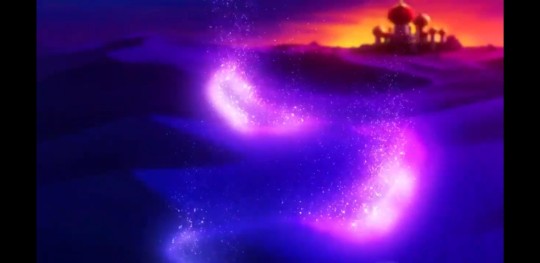
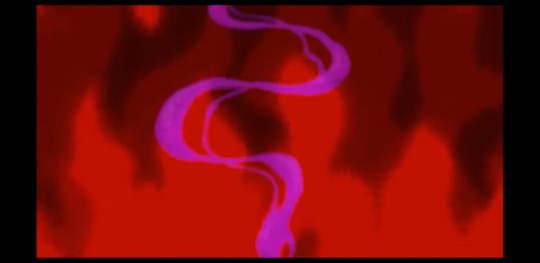
The opening of Aladdin (1992) is perhaps one of my favorites due to the fact that it seeks out to reference its source material: One Thousand and One Nights. By that I mean that it utilizes a technique known as the ‘frame story’: a story which contains within it another story. In the novel the framing device is Scheherezade, the vizier’s daughter who upon learning that she will marry Sultan Shahryar and be promptly killed at dawn, devised a plan to subvert her fate. She would each night begin a tale that would leave the Sultan so enchanted that he postponed her beheading until the next day so she might finish her tale. However, upon finishing the previous story Scheherezade would continue with another one and so on and so on until she eventually managed to avoid death for one thousand and one nights. Hence the name of the collection.
Aladdin uses a similar device in the character of the Merchant who appears at the start of the movie and introduces us, the viewers, to the world of Agrabah which is a place “where they cut off your ear if they don’t like your face” according to the original lyrics of the song. But it also includes a shot at the end of the movie which has the Genie lift up the ‘wallpaper’ and speak directly to the audience. These scenes, though easy to disregard, do reinforce the fact that the movie we’re about to see is not taking place as it happens, but rather a second-hand account of it. Much like Scheherezade attempts to avoid her decapitation, so does the Merchant at the start of the movie attempt to convince us to give the story a try, become immersed and then abruptly reminded of the fictionality of what we have just witnessed. And I don’t mean in the sense that it is a movie, but rather in the sense that even within the logic of the movie, this whole set of events has a certain fictionality to it. The fact that initial plans had the Genie and the Merchant be the same character only strengthens this notion.
But the Scarabia CM doesn’t start with the Merchant now, does it? No, it does not. But rather it starts with the very first image of the movie itself: purple smoke against a red flaming background. Except that there is no red flaming background this time, but a calming blue shot of the dunes with what appears to be the Scarabia dorm building in the background, or even Agrabah itself. There is no smoke either but sparkling dust that emanates from a lamp half-buried into the sand. The images are clearly meant to evoke the general aesthetic of Aladdin (1992), but they can also be interpreted symbolically.
The imagery of smoke is often one of ascension, of leaving the earthly shackles and rising higher towards the spiritual world. But it is also a rather solemn symbol as well, given that it can also be associated with the burning of corpses. Its presence in the movie is explained by the fact that this is after all a story about liberation: most obviously the Genie’s, but also the other characters. Everybody wants to be free in some form or another. The colour symbolism is also interesting to remark upon as according to Richard Vander Wende, the production designer of the original film, certain colours have different meanings within the movie. Red symbolizes heat and evil, while blue is a calm colour associated with water. The red background thus carries negative connotations, but it is eclipsed by the presence of the smoke in the foreground, that is a combination of red and blue. If we were to interpret this visual choice we could claim that the movie is trying to let us know that the story we are about to watch is one in which morally-grey protagonists overcome the forces of evil. For, even though Aladdin is our main character, he is not a pure hero by Disney standards as he is after all a thief and the lesson he has to learn is that he should not attempt to scam his way into a better social position.
But the Scarabia CM uses a blue background instead, so this is certainly not the same message it might try to send. Rather, due to the positioning of Scarabia/Agrabah in the background, I believe that it is indeed a story about rising above, but not above the forces of evil as much as above social norms accepted as standards. The Scarabia storyline is very much centered around the notion of social positions and how they function within a system of indentured servitude, as is obvious through the way in which Jamil attempts to overcome the position of servant through schemes and planning. We most certainly encounter the thread of evil within his character, but though his methods are unsavory, his end is, I would say, understandable: freedom.
Jamil: For me, and my family... I'll do anything for our sake!!! (4-31)
Jamil: I’m done playing servant!! I WILL BE FREE—!! (4-32)
The choice of a blue background might thus allude not necessarily to goodness as in the moral concept itself, but rather to the comfort of social norms. There is a certain stability to be had in a system that declares that all those born into wealthy families shall remain wealthy, and all those born into servant families should remain servants. To quote Aladdin: “It’s barbaric, but hey, it’s home.” (Arabian Nights) In such a system that relies on absolute conventions regarding social classes, someone like Jamil is a threat, because he questions and subverts the limitations imposed upon him. He is smarter and more capable than Kalim, yes, but because he must ensure that he does not draw negative attention upon himself, he is forced to adhere to a lifestyle that is not representative to whom he truly is. The similar shape of Scarabia and Agrabah only serves to highlight that regardless of his environment, as long as he remains a servant through his bond to the Asims, he shall never be able to change his destiny.
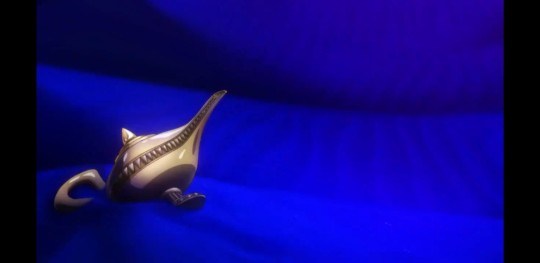
The lamp is the most important object in Aladdin (1992) as it is the MacGuffin that is coveted by Jafar and the prison of the all powerful entity that is Genie. The lamp in the movie has thus two connotations: power and imprisonment. The juxtaposition between the two creates an interesting image of how power changes according to one’s position in society. Though Genie’s powers are indeed great it seems that he is incapable of wishing himself free, which is I think a good analogy to the position of indentured servitude in which only a lord’s permission would be capable of restoring an individual’s freedom, even though they would be in theory capable of physically leaving their place of servitude. Their choice not to is not only a reflection of the possible corporal punishment they would endure if captured, but also due to the social contract that forced them to remain in that position. As servants they would remain branded forever as second-class citizens at best or dangerous felons at worst. Not a fate one would ever wish upon themselves in those days.
It is clear that besides Jafar, Jamil also bears quite a lot of similarities to Genie.
It’s like being the genie of the lamp, calling me anytime and anywhere. (Jamil Chat 1)
As I mentioned above, Disney draws an interesting parallel between Jafar and Genie when it comes to relating towards their ‘superiors’: Jafar despises the Sultan and wishes to disposes of him, while Genie forms a parental bond with Aladdin and even reluctantly agrees to remaining bound to the lamp if it means his ward’s happiness. The fact that they exchange positions at the end (Jafar being imprisoned in the lamp, Genie being freed) is the result of the moral choices they make. Genie’s altruism is what allows him to be freed, while Jafar’s ambition is what traps him as thus is the rule of Western philosophy: the needs of the others are superior to our own.
But ignoring Jamil’s OB for now, we realize that he does not truly commit to either one of those positions. He is resentful of his enslavement at the hands of the Asims, but I believe he does not genuinely wish harm upon Kalim himself, but rather towards the system as a whole, which is represented by him. This is an idea we’ll return to eventually, but it is important to mention it in advance, because it paints a better picture of what Jamil’s true intentions were during his attempt to take over Scarabia. It was not power for power’s sake as in the case of Jafar, but rather him trying to assert control over an aspect of his life, which in this case would be his position within the dorm. Jamil isn’t truly interested in the position of Prefect as is, but in what it symbolizes: freedom. As Aladdin shows power is not synonymous to freedom, but rather something adjacent to it. Even a most powerful creature like Genie is bound to the whims and wishes of a mere mortal, much like Jamil is bound to those of Kalim. To overthrow him as Prefect would mean to assert himself as independent of social bonds by having no one be superior to him anymore. Yet, because he does it through immoral means he fails and thus keeps in line with the moral of the movie: you cannot advance socially without the approval of your superiors.
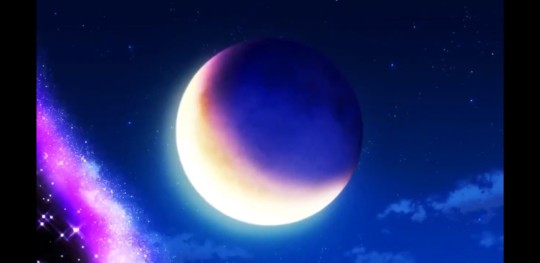
The moon is one of the most referenced symbols in literature due to the fact that it innately appeals to writers and poets alike. It is fundamentally female in nature, due to its connection to the Roman Diana and the Greek Artemis, and associated as a result either with the concept lunacy, to which it lent its name, as well as with witchcraft, solitude, power and change. The moon’s circular shape as observed from Earth is also associated with the notion of eternity and cyclicity, which is perhaps the symbol that is of most interest to us when it comes to Western interpretation, as in Japanese culture the moon can represent a person’s core, unaffected by others. It is more succinctly put a representation of the Self, that which is considered quintessential to one’s identity. And it is this imagery which the CM tends to gravitate towards I would argue.
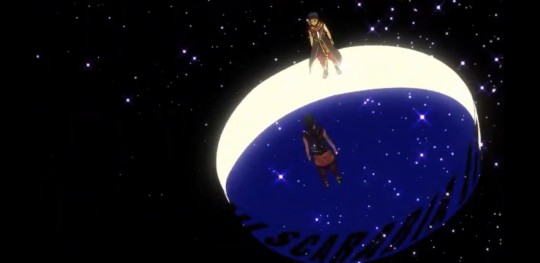
The moon is a particularly prominent symbol in Aladdin (1992) as it symbolizes the notion of change and new beginnings. Aladdin and Jasmine’s flight during the song sequence “A Whole New World” uses the moon as a backdrop and confers upon it a romantic aura of serenity and calmness, which is referenced towards the end of the movie wherein they fly towards it upon their success at convincing Jasmine’s father to allow their marriage. The moon in this regard is symbolic of unity and fortune, synonymous with true love’s conquest over everything else. But there is also a comedic twist to it as seen in the very last scene of the movie wherein Genie’s face is projected upon it. It is thus primarily a positive symbol associated with goodness.
The CM however is closer in meaning to the notion of the moon as the human core observed in solitude. Unlike the moon in Aladdin, whose shadows are barely perceptible and thus looks more natural, the moon here is overtly engulfed by darkness, with the sole space of light providing a sharp contrast in tone. It is not a symbol of unity, but rather of division creating barriers and boundaries between the characters who are positioned at opposite ends of the circle. Kalim, as a superior in terms of social and financial power, is situated upon the side that shines brighter to symbolize his role as the face of the dorm. He is the Prefect, the one that represents his dorm and the ideals that it is founded upon. Yet, upon further inspection we notice that the word ‘Scarabia’ appears on Jamil’s side, which is not only the dark part, but also takes more space. It is an unequal division but so is much of their life: Jamil remains in Kalim’s shadow, though it is only due to the former’s help that the latter manages to shine as a Prefect. This is confirmed by the positioning of their dorm’s name on Jamil’s side, as he is in fact the one that more overtly exhibits the ideals of careful planning that the Sorcerer of the Hot Lands is known for.
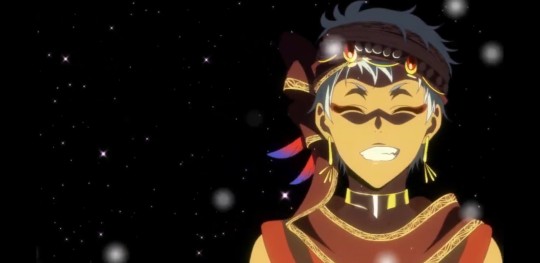
Kalim’s face change is interesting if we consider the notion of the moon representing the human core on which one’s identity is formed, because it confirms that he is indeed as cheerful as he appears to be. His cheerful disposition though likened to the image of the sun, lacks the usual masculine and aggressive features associated with it in Western culture, as he tends towards more feminine ideals of pacifism and serenity, which are associated with the moon. Moreover, as it has been pointed out to me, if one is to consider the Japanese cultural context we would be able to observe that the feminine characteristics of the sun are in perfect accordance with the female interpretation of the star in the form of Amaterasu. His body language is relaxed and openly friendly and there’s nothing about him that truly stands out in terms of contradictions.
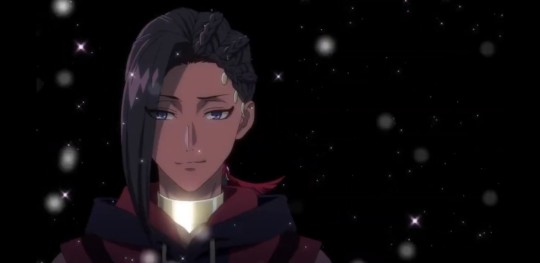
Jamil on the other hand presents an entirely different picture. His stance is guarded, that much is certain, and his expression is to be considered at best wooden. Unlike Kalim’s dynamic movement, he remains static and unchanging, sporting merely a look of resigned indulgence towards Kalim, and it seems to a certain extent as if he asserts control over his own reaction towards it. In other words, it is not in the slightest bit natural. Moreover, what does attract our attention is not his expression as in the case of Kalim, but rather the shine of the metal of his choker.
Unlike Kalim which is bathed in light in warmth, Jamil is surrounded by dark and shadows, with the sole point of light being the metal around his neck. This is different from Kalim whose accessories do not stand out in the same vein. The reason is that on a fundamental level they represent entirely different notions. In Kalim’s case it is a representation of his wealth and power, with the lack of focus on them hinting perhaps to the fact that he is at ease with his position as the heir of a multimillionaire family. It does not stand out because that is his right by birth and thus just a natural part of himself. Jamil’s core, on the other hand, reveals that his identity is very much forged by the Viper’s bond to the Asims.
Jamil: I’ve been looking after Kalim ever since we were kids. That’s the Viper family’s duty. (Jamil R School Uniform Lines)
In Kalim’s case the accessories are just that: accessories. But in Jamil’s case they are a mark of servitude. They stand out among the darkness because this is how he perceives his own persona: dominated by the image of the loyal servant who is socially inferior to his master. Even the metal itself seems to have a silver tint, rather than gold, symbolizing that even though he and Kalim should be equal (both sporting gold chokers) reality is very much different, since he is forced to be subservient even though it goes against his instincts.
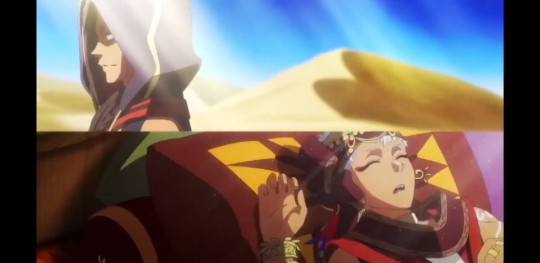
It is interesting to note that in Aladdin (1992) the notion of space and how it relates to characters plays a significant part. Agrabah, the setting of the movie, is a place of social division in which those of lower status live in poverty, financial distress and crowded spaces, whereas those of a higher status enjoy the luxury and the vast space provided by the palace. Compare the streets of Agrabah during “One Jump Ahead” which are constantly filled with people, objects and animals and project an image of recurring chaos, to the quiet serenity of the palace where the Sultan and Jasmine live. The contrast is staggering. But more than that it is indicative how much social class can make a difference.
It is also interesting to note that with the exception of the Sultan, all characters have at some point transversed these two spaces: Jafar and Aladdin move between the city, the palace and the desert, Jasmine sneaks into the city in order to experience real life and the Genie has access to a fourth space in the form of the lamp. However, the Sultan always remains within the palace walls. The reason for that is rather obvious: it is the seat of power and to leave it would be to admit to inferiority in regards to his position. Unlike the other characters that long for something more, the Sultan is content in his role as representative of financial and social power. He does not need to switch locations, because his static nature is what allows the other characters to progress in their journey.
The CM builts on this premise as well, by showing us the very different worldviews that Kalim and Jamil experience. Fulfilling the role of Sultan, Kalim is surrounded by luxury and comfort, as he rests in his room at the dorm. The colours are warm and calming, as the light very gently illuminates the room in order to cause an impression of coziness, which fits perfectly with his own character. Kalim’s personality is at its core a ‘refreshing’ one, orientated towards creating harmony and a content attitude. All his life was spent among servants that catered to his every whim and desire, so his sense of independence was greatly stifled. If we may put in blunt terms, he’s sleeping through life, relying entirely on his social position due not necessarily to laziness, but rather naivety. Because he never had to leave the palace walls, he never had to develop any sense of autonomy and thus has managed to remain faithful to his social role. He does not experience a sensation of contradiction between who he is and who he is regarded as because he lives in accordance to the characteristics deemed appropriate for him as a member of the elite.
The same cannot be said for Jamil. Juxtaposed with Kalim’s scene we see Jamil walking through the desert as the harsh light shines upon him. There is no comfort to be found in this particular shot. Whereas Kalim is sleeping peacefully and at ease, unaware of the difficulties of life, Jamil is wide awake. Unlike the former, the latter’s life is dictated by restrictions and hardships, all which he has to endure without showing displeasure as befitting his social role. He does not have the privilege of laying around not only due to the demands that are made of him, but also due to his innate desire for change. The desert can thus very easily symbolize the unfairness which he has to endure as a servant, but it can also symbolize his ambition and the effort he is willing to spend on making sure he can change his social status. Unlike Kalim, who rests in the palace, Jamil seeks to escape its confines even if it means enduring hardship. For you see, though the palace is indeed a place of stability, it is also a prison.
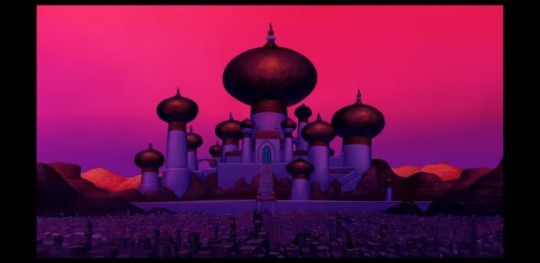
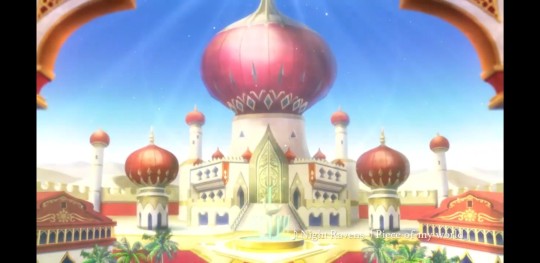
The similarities between Agrabah’s palace and the Scarabia dorm building are most certainly intentional. They’re places of unimaginable wealth that function as status symbols for the people that control them. Agrabah is, as we mentioned before, heavily divided, but it is paradoxically the slums that offer more freedom than the palace itself. Looking back at the movie we notice that the biggest symbol we can associate with Jasmine is the bird in the cage yearning to be free. The notion, moreover, is also supported by imagery such as setting the birds free after a talk with her father and, as it had also been pointed out by other critics, that the canopy of her bed is designed to resemble a birdcage. As a princess Jasmine is bound by social roles and conventions to adhere to the expectations placed upon her, and her journey in the movie is to assert herself as an autonomous person before her father by insisting that she be allowed to make her own choices. The problem however lies with the word ‘allow’ itself which once again contradicts her ideals. The notion of allowing someone to do what they want situates the power in the hands of the person who is recognized as the social superior. In the case of Jasmine, it is her father, the Sultan. In the case of Jamil, it is the Asims.
The Scarabia dorm as a symbol of the prison is an obvious one due to the fact that it served as such for Grim and Yuu during episode 4. But that is what we might refer to as physical confinement, which at its core is not compatible with the message of the CM and even of the movie. Because the CM does not focus on Grim and Yuu, but on Jamil and Kalim, so this is not a case of a physical prison, but rather a mental one I would argue.
In several respects, the prison must be an exhaustive disciplinary apparatus: it must assume responsibility for all aspects of the everyday individual, his physical training, his aptitude to work, his conduct, his moral attitude, his state of mind; the prison, much more a than the school, the or the army, which always involved workshop certain specialization, is 'omni-disciplinary'. Moreover, the prison has neither exterior nor gap; it cannot be interrupted, except when its task is totally completed; its action on the individual must be uninterrupted: an unceasing discipline. Lastly, it gives almost total power over the prisoners; it has its internal mechanisms of repression and punishment: a despotic discipline. It carries to their greatest intensity all the procedures to be found in the other disciplinary mechanisms. (Foucault 235-236)
Foucault’s Discipline and Punishment: The Birth of the Prison is an interesting look into the social and theoretical mechanisms employed by prisons in order to ‘reform’ convicts. The end goal of these institutions is to reintegrate the individual into society and to achieve such a thing it is not necessary just to punish and torment them, but to discipline them. By this Foucault understood as allowing one’s life to be entirely dictated by “a disciplinary apparatus” decided by those within power. It’s main aim was to restructure one into a “docile body” beneficial for the economical and political necessities of that specific age, which in many cases referred to the idea of one being content to pursue the interests of the state and those that governed it.
I bring this up because I can see the same ideas reflected in Jamil’s character arc as well. Foucault mentions that the prison is a space in which discipline is uninterrupted and unceasing. In other words it is a space which constantly reinforces the ideals that are considered desirable, and we can see that Scarabia unintentionally functions the same way. It is a space in which Jamil is cast as inferior to Kalim once again, trapped into the position of Vice Prefect, despite the fact that he embodies the ideals of the dorm more than he does. Though this is a different place, his routine has remained unchanged: he must still cater to Kalim’s wishes and perform the role of the servant, despite the fact that in theory the two of them should be equal now.
Scarabia Student B: Our family standing and status shouldn’t matter inside the school! We’re all equal here, right? (4-18)
Under normal circumstances, Night Raven College is supposed to be a neutral space in terms of social standing. Leona and Malleus are recognized as princes, but are not given any particular attention in terms of political and social superiority, and rather scrutinized due to their peculiar attitudes and personalities. They are, in theory, equal to the other students at the academy and the same should apply to the relationship between Kalim and Jamil as well. But things are not so.
During episode 4 we find an interesting detail about Scarabia: it seems that the building had been renovated once Kalim was accepted into the dorm. This is not usually a detail that would require any particular attention, but it reveals something about the environment in which Jamil resides: it is representative of the Asims. The ostentatiousness and extravagance are the result of their direct influence and thus molded by their own desires. By remodeling the building they have reforged it into an image of their social position and installed a member of its own family as leader. Its neutrality has been compromised and so has Jamil’s attempted escape. Attending Night Raven College is not merely a case of attending one of the best magic schools in the world, but also one of asserting one’s independence. Jamil was given the chance to finally break free from the system that has had him ensnared for all his life, only to have his hopes be dashed by being reminded that in the end the influence of his masters is much greater than he could have anticipated. Thus, Scarabia was turned into a space of imprisonment which perfectly replicates the dynamics of the Asim household and thus denies Jamil any possible form of freedom. Much like Genie and Jafar at the end of the movie, he is unable to escape his prison without the approval of his superiors.
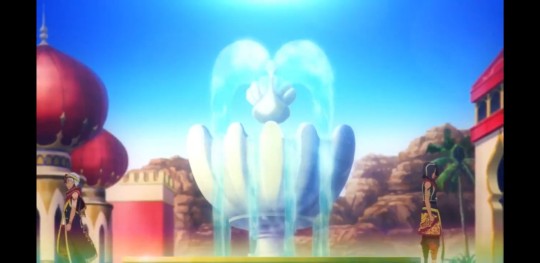
Jamil is aware, however, that he is not and will most likely not ever be able to receive such freedom from the Asims. And consciously he knows he cannot attempt to break free on his own either.
Jamil: My family, the Viper Household, has been serving the Asim Family since olden times. A retainer drawing his sword against his master is unforgivable. Even more so, if Kalim’s father found out about it, my family will end up being punished. I’m sorry, but I cannot put my family in danger just because of a selfish request. (4-18)
Jamil’s sense of filial duty is one of the driving forces behind his character. It’s not only that he himself wants to be free, but wants his family to be released from their bonds as well. Because the system in which he has been raised permits a master to punish an entire family for the disobedience of one member it becomes understandable why Jamil is such a guarded person. It is not merely his own person that is at stake, but the lives of those he cares about also. It is a thought that has weighed heavily upon his head since young childhood most likely, once he became aware of how exactly the social system set in place works. To go against it would not be an act of brave rebellion, but that of sentencing others to punishment to fulfill his own ambitions. Which for a character twisted from Jafar seems contradictory. Yet we must remember that he has certain traits of Genie as well. Unlike him whose loyalty lies to his Master, Aladdin, Jamil’s loyalty lies to his family. He’s only willing to endure things as they are now due to the fact that rebelling would mean having them suffer the consequences. And Jamil is aware of that.
Yet, it is also necessary to ask the following question: Why does he end up rebelling in the end?
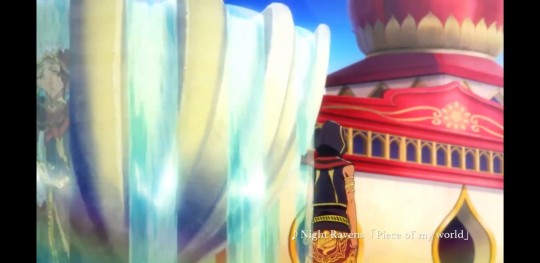
The most obvious answer: accumulated frustration.
As I stated before, Jamil does not hate Kalim. However, it is also obvious that his Overblot had very much to do with the fact that he had become increasingly irked by the latter’s attitude to life. His critique of Kalim’s character, though harsh, was entirely accurate. Kalim is indeed spoiled and naive to an almost ridiculous degree, even though it is not entirely due to his own fault. Moreover, it is not necessarily these particular traits that Jamil takes issue with, but rather his predilection towards inaction. To briefly reference a previously discussed shot: though Kalim is content in his passivity, Jamil cannot abide by the current system. He desires change, but he knows he is in no position to enact it and is thus frustrated that the one who would be able to perform this task is oblivious to the struggles of those around him. Jamil does not hate Kalim as a person, but rather that which he represents: the power of the system itself. As the CM shows Kalim is able to move forwards, uncaring of limits and boundaries, but uninterested in change (initially) while Jamil, though he desires to advance, is stuck in one spot.
The brief image of Kalim reflected in the surface of running water captures this concept perfectly. Jamil is not looking at Kalim as he is, but rather as perceives him to be: an unclear image. Water has the same reflective properties of mirrors, but due to their unstable state they cannot portray accurate images. Jamil attributes maliciousness to Kalim’s denseness as not only a means of explaining his actions, but as a way to excuse his own eventual betrayal of him. If Jamil considers Kalim as a representative of the system, he feels justified in his actions and thus more willing to go through with them, since he can project his frustrations upon a material, solid person rather than an abstract entity. Kalim is in a sense a scapegoat for Jamil’s anger.
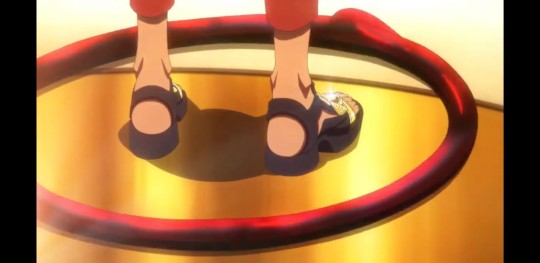
The snake is laden with multiple meanings being both a manifestation of evil (Satan taking the form of a serpent to trick Eve into sinning) as well as a symbol of rebirth and transformation. In keeping with the colour motif of the movie the serpent staff that Jafar carries with him has eyes which glow red when he’s using it to hypnotize the Sultan to indicate his evil influence upon him. In the CM we have the image of a red snake coiling around Jamil’s feet which is the physical manifestation of all his feelings of dissatisfaction regarding his position as a servant finally bursting apart. But before he is overtaken by those negative feelings we notice interestingly enough that the snake takes the form of an ouroboros: a snake which eats its own tail. A symbol of eternity.
Jamil: I’ve been raised as a retainer to serve his family, so I really can’t understand. A master is a master and a servant will be a servant. Most probably for as long as we’re alive. (4-26)
When discussing Jamil’s character we must admit to a certain cyclicity. Not one he engages in, but rather one in which he is stuck. He is the son of a family that has served the Asims for generations, creating a chain of servants and masters that is currently supposed to be replicated by him and Kalim. His sense of autonomy is constantly denied due to the intervention of forces beyond his control. Moreover, in chapter 4 itself his plans get constantly ruined by either Grim or the Octavinelle Trio, creating a sense that the universe itself has aligned itself in opposition to him.
But there is more to it still. Jamil is a highly ambitious person, who desires to establish himself through his talent and skill, thus giving him the perfect reason to despise a system that requires some individuals to be subservient to others for arbitrary reasons. However, by his own admission he cannot envision a life outside the system either. This is in essence the insidiousness of such phenomena: they entrap not only the person physically but psychologically as well. Once one’s identity is dependent upon a certain ideology and philosophy of life it is extremely difficult to extract themselves from that mindset. Much like Foucault said, once the mind is disciplined and the individual turns into a ‘docile body’ they become reliant on that particular system in order to form a coherent identity.
Though Kalim can step outside the bounds and limits imposed upon him, by virtue of his social position, Jamil is only allowed to operate within those boundaries. It is precisely why he stops advancing further once he reaches the end of the round court. Though physically he should be able to overcome such obstacles, mentally he is unable to not. Not as long as he remains under the governance of the Asim family, at the very least. It is obvious however that he cannot simply rise against them, and this realization is what causes him to hit the limit in terms of patience. He finally realizes that he has been robbed of his independence even before he was born.
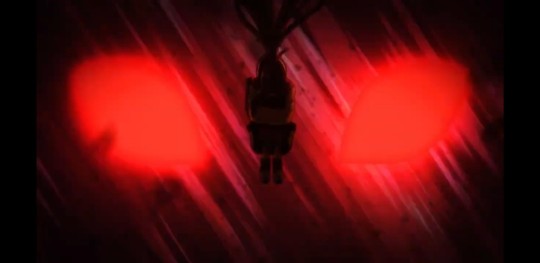
Jamil: But if I have, it’s better you don’t know what I really think of you. If everything goes to plan… I’ll finally be free. (Scarabia CM)
Sight is an important theme to Jamil’s character as he, much more than any other character perhaps, actively attempts to manipulate the perception of others about him. He is not what he appears as Azul remarks in many of their interactions, and that is because to Jamil allowing himself to be genuine would come with a price: revealing his true feelings regarding his social position. And that, as previously stated, is not something he can afford.
Eyes are often called the ‘windows of the soul’ in the sense that they reflect a person’s true intentions and thoughts. Moreover, the notion of sight is one that literary authors often like to explore in their works. Out of all the senses, sight seems to be considered the most unreliable, since it often fails to discern that which exists in obscurity. The notion is explored in Aladdin (1992) too to a certain degree. Everybody sees only what they desire to see, and because the images they form are so contradictory that it creates misunderstandings and unnecessary conflict. Jafar’s power of hypnotism is even more interesting in this context since by definition it allows him to influence a person’s perception of reality and thus a part of their identity and how they relate to their environment.
The end of the CM hints towards this notion as well, as we see that the Overblot first manifests itself is his eyes, obscuring his sight from the reality around him. He’s chosen to throw himself into the negative emotions that have finally overtaken him, and as a result given him the power to recreate reality to his discretion. We see the parallel with Genie and Jafar in his Unique Magic as well, since though he possesses one of the most potent powers, he’s still considered an inferior. Jamil’s Overblot is thus one formed by the depressing realization that for as long as he exists within the system, he’ll be forced to endure the continuous cycle of subservience forced upon him since before his birth. His transformation moreover is the result of a desperate yearning for freedom which has driven him to extreme actions. The appearance of the red eyes behind him symbolize more than the eyes of the serpent staff. They are a stark reminder that he is consumed entirely by the realization of his own powerlessness and over-dependence upon the Asims, even if it’s against his desire.
To note is also the fact that out of all the Overblot victims, Jamil’s expression is the only one that is peaceful. If we take a look at the Heartslaybyul, Savanaclaw and Octavinelle CMs all of the Prefects display either rage or shock during their transformations. It is clear that this process is a horrific one, which explains their reactions, yet strangely enough Jamil seems serene and accepting as if he has come to terms with this course of action. Unlike the Overblot victims before him, his transformation is liberating to a certain degree, because it allows him to finally achieve his goal: get rid of Kalim and instate himself as leader of the dorm. Not because he covets the position itself, but rather because through it he manages to finally become free and unburdened by his social position. In a way, the dark appeal of Overbloting is just that: unlimited power, and for a character like Jamil, who very much lacks this, it is especially hypnotic.
Out of all the Overblots so far, I consider Jamil’s the most tragic because in the end there seems to be no obvious escape for him, perhaps except in the case of Kalim setting him free. But this is still an event that will happen in a few years at best. It does not answer his current need for autonomy. Yet, despite this we see in chapter 5 that there is indeed some improvement. Though he has refused Kalim’s offer of being friends, he nevertheless has begun acting more like his equal within school grounds and their relationship overall seems less hostile on his end. The fact that much of the action of chapter 5 takes place in Ramshackle Dorm is also an important thing to note as it manages to create a neutral space, untainted by the Asim’s interference. In Vil’s system of meritocracy Jamil is finally able to act as himself and stop performing a role for others, thus he is finally able to assert a degree of autonomy over his own person, which he was not capable of doing before.
Coming now to the ends of this post I think it goes without saying that in terms of narrative cinematography the Scarabia CM is currently unmatched. Though short it manages to give a perfect summary of the themes explored in episode 4, the relationship between Kalim and Jamil and a brief but insightful look into the latter’s psychology and reasons for Overbloting.
So, there’s really nothing else to do but thank Yana for giving us such a wonderful CM for what I consider the best dorm and best boys in the whole game.
Additional Links
Indentured Servitude: https://www.youtube.com/watch?v=Qt--B1Y-u6Y
https://www.youtube.com/watch?v=Ti7Kbd6gSIo
Twisted Wonderland, Episode 4: https://kanadesmusingsblog.wordpress.com/2020/06/01/masterpost-twisted-wonderland-episode-4-translations/
Jamil Chats, Personal Stories: https://twisted-wonderland.fandom.com/wiki/Jamil_Viper/Personal_Story
https://twisted-wonderland.fandom.com/wiki/Jamil_Viper/Chat
Scarabia CM:
https://www.youtube.com/watch?v=EVSx_BvTlmQ
Aladdin (1992) commentary: https://filmschoolrejects.com/38-things-we-learned-from-the-aladdin-commentary-fd9f1d8573b3/
--------------
The peeps over in the Twisted Writings discord know this has been brewing for a while, but I’ve finally managed to sit down, write and edit this monster. It bears witness to the fact that I adore Scarabia more it is healthy (lol).
Also wanted to thank fellow Scarabia stan buddy @chillableu for proofreading and brainroting with me about these boys. You’ve been such a great help and I’m so thankful to you! ❤️ ❤️ ❤️
All the translation sources have been linked in the last section of the commentary.
#twisted wonderland#jamil viper#kalim al asim#scarabia#meta#twist#twisute#twist meta#twisute meta#overblot#vil schoenheit#rook hunt#leona kingscholar#ruggie bucchi#lilia vanrouge#malleus draconia#riddle rosehearts#trey clover#twisted wonderland mc#twist mc#grim#episode 4#idia shroud#ortho shroud#azul ashengrotto#jade leech#scarabia cm#cm analysis#cm meta
260 notes
·
View notes
Text
The 8 Theory-Folklore’s Commentary on Youth
Yesterday, I took note of @taylorswift and her careful attention to the number 8.
“Not a lot going on at the moment” had 8 words. The 8th track is “august,” which is also the 8th month in the year. She has 8 deluxe editions of her album. Many attributed this to Folklore being Taylor’s 8th album. I thought it meant either a.) we needed to pay very close attention to track #8 or b.) that 8 references infinity, a.k.a “forever and ever.”
To my surprise, I was actually selling Taylor Swift short.
When listening to the album, there’s a lot of back and forth in emotion and circumstance. I was confused about the order, especially when the strikingly sobering “hoax” followed the self-aware almost-tranquility of “peace.” Then it hit me. There are two schools of thought going on.
There are 16 tracks on Folklore (excluding the bonus track none of us have heard). 16/2=8. This means there are 2 equal emotional song threads on the album. In other words, you can get two drastically different lessons listening to each group of 8.
When you separate the even numbered tracks from the odd numbered tracks you get the following:
Odd
the 1
the last great american dynasty
my tears ricochet
seven
this is me trying
invisible string
epiphany
peace
Even
cardigan
exile
mirrorball
august
illicit affairs
mad woman
betty
hoax
Odd Interpretation:
Starting with “the 1” and “the last great american dynasty,” the lyrics are very upfront in showing that the protagonists are making fully intentioned mistakes. “the 1” says, “in my defense, I have none for never leaving well enough alone” (I see you “ME!” reference). In “the last great American dynasty” it says, “she had a marvelous time ruining everything.” These characters’ folly is their youth-induced selfishness. They’re casual in the harm they cause because they distance themselves from it. They’re fine with what they don’t look at closely. When you’re young, you make a mess of things in service of YOUR need. Your need for companionship. Your need for the thrill of danger. Your need to make your mark, to be somebody, to leave something behind. The marvel of the excitement and the chase and the very vitality of teens to 20-somethings’ shenanigans blinds us to the scale of our destruction…
…until you have no choice but to face the consequences of your recklessness.
The next track, “my tears ricochet” is not your average track 5. It functions as a pivoting point. Now our narrator is the hurt party, the one baring the brunt of callous treatment. Fickle mistreatment is no longer so casual. Now it’s a torment, and the tormentor learns the scale of their damage. So much so, that they get burned too. They learned their lesson at a terrible price, but what’s most important is that they learned.
“seven” is a long-overlooked memory revisited. In this picture of naïve innocence, the narrator tells of their childish belief in the impossible. Through magic and play pretend and fantasy they are invincible. They have all the control in the world to control the world they live in. Obviously, this is a flawed perspective that everyone eventually grows out of. Fairy tales don’t solve real problems. The point is that their sense of self-importance is in service of a stronger moral compass than the first two songs. If we accept our responsibility to others, to do what we can to ensure their welfare, are we not better and more satisfied people for it?
“this is me trying” hears that lesson and attempts to walk the walk. Part of being responsible to your fellow human is taking accountability when you fumble. The narrator doesn’t know what to say or how to make it right. What they do know is that they’re here, they’ve put the bottle down, and that they’re willing to try what’s necessary to heal what they’ve hurt.
“invisible string” gives us the reward we’ve been waiting for. The narrator says, “cold was the steel of my axe to grind for the boys who broke my heart, now I send their babies presents.” This is someone who has gone from lashing out in anger at a partner from a burned relationship to genuinely wishing them well in their next stage in life. It’s a powerful testament when you can recognize that youth drives us all to make hurtful decisions and that no one is immune to change if they truly want to change. When you let the anger and lies go, the strings that tied you to them fade away. All that’s left is the string you want to hold onto. The string tied to the one who matters, because you’ve made the conscious decision to deduce that their worth as a person should equal yours. It’s a painful path to traverse through, but when you do it’s all worthwhile. That’s why the narrator can say with confidence “hell was the journey but it brought me to heaven.”
In any other album, a song like “invisible string” would be the quintessential emotional payoff for this story arc. However, because this album is a masterpiece, we have a different payoff point in “epiphany.” “epiphany” takes us out of the world of a romantic relationship. We hear descriptions of war and nurses dealing with the despair of this international pandemic. This point in this emotional thread is that it powerfully declares it’s not enough to do no harm nor is it enough to just empathize with your romantic partner. You MUST show your responsibility to your fellow man. Stand beside them. Empathize with them. See them as whole human beings. Do good by them. In other words, it is our duty to do right by everyone, for everyone bleeds, loves, and dies.
The 8-song selection ends with “peace.” The song begins by saying that their, “coming-of-age” has come and gone.” I believe this (along with “invisible string”) to be the most overtly “Taylor Swift” track in perspective. This is her speaking as herself. She lets us know that she’s grown through taking her mistakes, and the mistakes she learned through folklore, into account. She is overly aware of her flaws and feels she pales in comparison to her partner. Rather than allow those insecurities to manifest in unchecked rage or resentment, she takes it as a challenge for herself to do better. She knows she can never give him complete peace (due to inside and outside factors), but she can make the choice to give him unselfish promises and embrace the entirety of her partner’s life. This is a person who has learned the value of selflessness in love and life, which makes this whole thread worth everything.
Even Interpretation:
“cardigan” foreshadows the eventual failure of the even path. The odd interpretation I just described culminated in the narrator finding their place with “the one” because they’ve left everything petty and casually cruel behind. In “cardigan” it says “chase two girls, lose the one.” On top of this directly referencing the first track, it also implies the partner’s self-destruction. By toying with two girls, James is losing “the one.” I don’t think losing “the one” means that you keep one of the two of them. I think it means that engaging in that kind of behavior makes you into a person that isn’t ready, or worthy, of “the one” that they are meant to be with forever. Meeting and keeping “the one” has to require each partner to love themselves and their partner wholly, truly, and selflessly. They can’t be a cardigan you pick up and only wear on the weekends. They must be a wholehearted commitment.
“exile” shows the blowout from “cardigan.” The two couldn’t stay together, and Bon Iver’s (character’s) toxicity comes out full force. He thinks her new man is lesser than him. He’s prepared to throw punches despite being at fault over a hundred times. He’s seen the film before, and he didn’t like the ending because it didn’t work out for him. He wants her under his thumb, not having learned from his prior relationships that that just can’t work. They leave out the side doors, neither fully ready to confront the problems head on.
“mirrorball” is daring in its shift of focus. While all of the tracks I’ve mentioned thus far have dealt, in some way, with the problems that result from a young person’s selfishness, this song doesn’t do that. This song illustrates an extreme that young people participate in at the opposite end of the spectrum; radical selflessness. To be selfless means that you should never allow something that harms someone else to happen just because it benefits you. Young people, girls in particular, are often groomed to interpret selflessness differently. Their definition is synonymous with accommodation. Change your looks, change your personality, don’t object, and embody what your partner wants so that they’re happy. That’s why the symbol is the mirrorball in the song. It reflects everything in the room but itself. By explicitly not factoring in their own sense of self-respect in a relationship, they are unknowingly and tragically enabling their partner’s mistreatment. To be clear, that doesn’t mean abuse is their fault if they have low self-esteem. It’s not, even remotely. But not having the capacity to defend your self-worth is what keeps so many drawn into toxic relationships there for so long. This radical selflessness manifests itself in the other woman too. In “august” it explicitly says that she was living on the, “hope of it all” and that she would cancel plans in the name of a potential hookup with someone who was never hers. The idea of radical selflessness culminates in “illicit affairs” when one of the women deals with their addictive compulsion toward someone who treats them like a cheap lay. Their relationship is a secret that leaves her feeling used in parking lots and as though any trace of her is gone. These three songs have taken the desperate hopelessness of “Abigail gave everything she had to a boy who changed his mind” to the extreme.
Many have speculated that “mad woman” is a commentary on the Taylor/Scooter conflict and I’m inclined to agree. However, if I were to assign an interpretation that goes with my theory, I would say that “mad woman” details the unforeseen consequences of a tormentor’s abuse. When a toxic partner performs bad behavior, their expectation is that they will always be found in the right. After all, Taylor noted on her previous album that for men, “everyone believes [them].” So in the face of lies about her character that everyone believes, she gets rightfully angry. Her anger is their affirmation. For many, a woman being angry on her own behalf is “crazy” and “irrational.” What kind of a society have we set up? A society that promotes women to lack self-worth and, should they find it, they’ll meet a whole other exile.
“betty” is our complete look into James’ perspective. On its own, it sounds like a big romantic gesture to get behind. However, this path is very clear to put “cardigan” first. “cardigan” says, “I knew you’d miss me once the thrill expired and you’d be standin’ in my front porch light.” Lo and behold, in “betty” he shows up to her party when she doesn’t want to see him and asks if she would, “kiss [him] on the porch in front of all [her] stupid friends.” It’s an absolute punch in the gut. Betty knows in “cardigan” that he would come back after he had his fun with another girl, but that she would take him back when he saw momentary value in her again. James in “betty” claims he didn’t know anything, but that’s just an excuse. He knew what he was doing, he knew that he would be able to pick up her broken pieces with ease, he knew he could isolate her from her friends, and he knew that he could capture the imperfect “comfort” of that cardigan again.
This path ends in the final even-numbered song, “hoax.” In the odd numbers, “peace” shows a lesson learned. This even path shows what happens when we don’t learn. The seeds of youth-driven mistakes have led us here. The narrator wants nothing outside the pain of this faithless love. Without learning what it means to be selfless, the traumas of these young relationships create a never-ending cycle. The narrator knows that the “love” is a “hoax” but doesn’t care because that’s all they have. There’s no point to wanting anything else. Without the perspective of age, of truly going beyond that, they’re stuck in a truly dark place.
Final Thoughts:
Taylor Swift is an exceptional artist for a lot of reasons. No one makes albums this good this far into their career. Most artists teeter off after two or three because they retread. Their audience inevitably gets bored of them e same thing time and again. Repeating themselves is something that a lot of artists do because they want to go with the formula of what works. With Folklore, Taylor has done what few artists have dared to do. She’s allowed her discography as a place to uncompromisingly expand her worldview and challenge her listeners. She’s not reiterating previous lessons to make another quick sale. Instead, every album prior has been a steppingstone. As she said at the Time 100 Gala, she has truly turned her lessons into her legacy. From a variety of narrators, she has brought what I decree to be her best album to date. This wouldn’t happen for anyone else 8 albums into their career, but she’s done it by devoutly embracing age’s wisdom.
Learn from the highs and lows presented in these paths. As all good folklore does, it teaches us how to live better. It is our duty to live selflessly and with self-assured dignity. These writings, I have no doubt, will become integral to the legend that is Taylor Alison Swift.
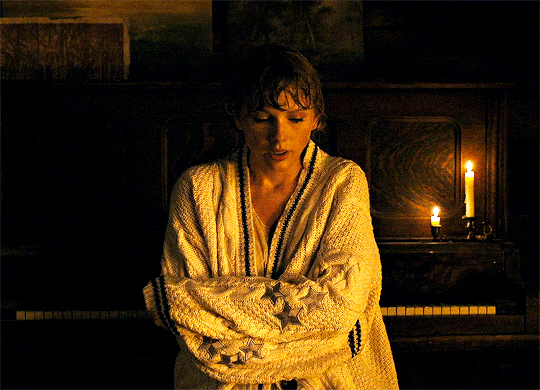
#folklore#taylor swift#ts8 theories#ts8#the 1#CARDIGAN#the last great american dynasty#exile#MY TEARS RICOCHET#mirrorball#seven#august#this is me trying#illicit affairs#invisible string#mad woman#epiphany#betty#peace#hoax
585 notes
·
View notes
Note
Irish-American musician speaking. I just want to say a couple of things (a) i appreciate that other people are at least willing to criticise Jeff (even though i don’t agree that he was copying “ethnic” styles of music because that’s just bullshit and he was just going for a specific feeling, because that’s how music works) and (b) i really appreciate that this blog takes James' character seriously and not whatever the fecking hell the writers think they've done.
i did want to say that i'm really upset about it as a person with an autistic specturm disorder. i doubt the writers (bless their hearts) realised it, but the semblance they gave James is one of the hallmark signs of ASDs, especially in adults and young people. given the way they've always written him until the end of season seven, i really related to him and his struggles for a variety of reasons. i could get just as angry about the way they've portrayed military service (my dad is a similar ranking to the character and has been through some shit) especially given that a lot of people in my family have or are serving, but i get the sense that everyone sees how problematic that demonstration is. the former is a lot more subtle, and it honestly upsets me more.
and then there's all the bullshit surrounding Penny (they should have just left her dead or given Winter the powers to begin with for fuck's sake). firstly, i'm just going to come out and say that i've hated the way they've used vocal music to bash us over the heads with messages the last few volumes. Cinder's TWO (whyyyyyyy) songs in just that one episode this volume were basically narrating what was on screen which took away from the moments and the second one during her fight with her mentor was just plain bad. i thought those two were the worst we were going to get but apparently i was wrong and we get whatever the hell "Friend" is. (although i will say i bet the only reason they threw in that second song for Cinder was because Casey just had to get publicity for her shitty band). but look. i'm lgbtqia myself and it really (especially considering Penny and Ruby's intereactions) felt like queerbaiting/bury your gays but i'll set that aside. making Penny human (a) took away the only unique/interesting thing left about her character and (b) her death was essentially a glorifying suicide "for the greater good" which really slaps in the face of people who have honestly suffered from depression and suicide.
this isn't the first time that they've shyed away from trying to explore serious subjects, but it is particuarly gross because of the song. an earlier example of them doing this is with regard to "the path to isolation" when Casey felt the need to say Weiss has never cut and that she wouldn't do that. while that was (to say the very least) a bit uncomfortable for her to just drop that, it sounded like she just wanted to avoid talking about the subject because it's too dark. i have a lot of problems with Casey and her actions over the years, but i think it's important to note that SHE WROTE PENNY'S SONG. she is the one responsible for this, and she keeps talking about how great it is and how "humbling" the experience was. bitch no. you can't just take only praise and get mad about critisicism to the point where you basically recieve none anymore.
besides, Casey is pretty hard to understand because she STILL doesn't enucniate much when she sings so if she and her dad are going to keep being basically worshipped hand and foot by people while recieving no criticism even where it is due, then they shouldn't be in this or music. part of being a musician is that you SHOULD be critiqued by your peers and even by just casual listeners but that doesn't happen and they (but especially her) don't improve. by no means do i think Casey and Jeff are the worst of CRWBY, but they are part of the problems with tone in the storytelling and they should be critiscised for it more.
oh god this is a long ask & it’s like a month late, please forgive me.
yeah, my issue with the whole jeff issue was never that he was “copying” ethnic music, though there is a discussion to be had when that music comes from closed off cultures like my own & others & how that should be respected, but that this vague claim by someone who’s lied to push their headcanons before was using it to claim ruby & summer were romani coded when there has been anti gypsyism sentiment in crwby before via arryn’s sexualization of us. i simply don’t trust these white americans to write any gypsy ethnic groups’ stories with any sense of respectability & it was on a baseless headcanon anyways so. that frustration was easy enough to let die down.
i also have a lot of issues with how ironwood was treated, especially as a disabled person & some of the fndm’s insistence to treat this fictional military as a 1 to 1 representation of the flawed militaries in our world is just utterly frustrating. especially when they use that to justify theirs & crwby’s ableism towards one of the few disabled characters we had on screen. i don’t have a place to speak on any autistic representation or harm from ironwood or his semblance because i’m not autistic but i am sorry that you were harmed & upset by this portrayal of a semblance that isn’t even canon, because it features nowhere in the text explicitly. hell, ironwood’s va had to be told what his semblance was from a fan. all this harm & hurt & it’s for something that isn’t even featured in the story. ridiculous.
i’m really trying not to waffle on in this ask because it is so long already but yes yes yes. i agree with you completely, the way that songs are crafted for this world & featured into it most of the time doesn’t fit with what we’re shown on screen. weiss’s songs feature a patriarchy & go over the same arc like five times, as well as those lines alluding to self harm. jeff & casey can cry that they didn’t mean it that way but there are certain themes brought to mind with certain wordings & you have to be mindful of this when you write them; we had this same issue with people believing mercury was sexually abused by marcus because “i’m the one” featured the word defiled, which is most used in a sexual context. when we come to learn that it meant his soul was ruined by his father stealing his semblance, that still didn’t erase the sexual allegory & jeff should have been mindful of those types of themes when he’s writing these songs. often times it feels like the songs & the show are giving us two different stories & both give off different meanings & themes.
not being able to take criticism seems like a common theme in crwby, self admittedly from miles himself who said he “wants” to take criticism but doesn’t like it when “it’s done in a mean way.” that criticism has to be fair & nice, which is a solid sentiment, no one’s going to listen if you’re being an asshole but here’s the rub. nothing is ever nice or fair enough for them. they always find a way to turn even the most innocent of criticisms or questions into a personal attack & it’s pathetic. jeff & casey aren’t exempt from this. like you said, part of being a musician is criticism from your peers & much like you don’t need to be a chef to tell if there’s dogshit on your plate, you don’t need to be a writer or a rock star to tell when a story isn’t making sense or a song isn’t good.
& for fucks sake, i’m with you on them needing to enunciate better. i’m hoh, please jeff & casey, it’s hard enough for me to try & listen to songs that i want to enjoy without having to wonder what word you’re mumbling for this third rhyme in bad luck charm. fuck that song’s rhymes.
13 notes
·
View notes
Text
February 13: Star Trek Beyond
Some attempted thoughts on Star Trek Beyond.
So first it was bad lol. It is the worst. I thought maybe it would be less the worst than I had previously thought but it really, really is just irredeemably bad.
Trying to keep up with what was actually happening and talk in the group chat was too difficult and I now feel very exhausted lol. And I’m not even sure what I watched.
I liked Jaylah a lot, including her back story, characterization, “house,” traps, and cool mirror tricks.
I also like Kirk in that emergency uniform with the jacket unzipped.
That’s it! That’s all I liked.
In the past I’ve also said I liked the Spock and Bones parts but I honestly wasn’t a fan of them either this time around!
None of the characters felt IC and none of the relationships felt true or were compelling. Which is particularly egregious given that the alleged theme was strength in unity.
The movie was especially lacking in K/S content or even K & S interaction, which obviously didn’t please me. And it’s definitely the worst Kirk characterization I’ve ever seen. There’s no excuse for that either because it’s halfway through the 5YM, which means he should be pretty close to TOS Kirk--yes, he has a different set of experiences, so there’s going to be some variation, but there’s comparatively less excuse for a radically different characterization than in STXI and STID. They should have had Shatner read the script and make notes lol because whatever else you might say about him he KNOWS Captain Kirk.
Like, he (Kirk) lacked humor and charm and, often, confidence. He had moments when he was very smart and moments when he had a commanding presence. But he had just as many moments when he was whiny or bored and his Captain’s log??? I deserve financial compensation for every time I’ve listened to that. Bored of space?? No, this man is bored when he’s stuck on Earth. He stagnates in desk jobs. He is an adventurer and explorer before he’s ANYTHING else; if you don’t get that, you don’t need to be writing Star Trek.
Also, as I have frequently complained, I’m tired of him having no internal conflict or emotional complexity past his father issues. First reboot movie: dealing with his dead father’s memory and his step-father’s abuse. Fine, that makes sense for how they set up the AU. Second reboot movie: entirely motivated by the need for Manly Vengeance upon the person who killed his father figure. And for this redundant story line (in many sense) we had to lose Pike? Third reboot movie: you’d think he’d finally be ready to move on to other conflicts but actually no this time he’s sad about his birthday and having a longer life span than his...you guessed it!! father!! Yet again.
What else has ever motivated him? Legitimate question.
The destruction of the Enterprise was truly horrific. Long, boring, unwarranted, and without any emotional punch. As if it were just any ship! No, she’s a character in her own right and she’s not to be sacrificed like that but please tell me again how Simon Pegg is a true fan who brought the franchise back to its roots?
B said he did like that they split up the crew into unusual units but I have mixed feelings about it. I don’t entirely disagree, but I don’t think they did a lot that was interesting with any of those separated units. Uhura and Sulu are a cool pair (but this would have been a good opportunity to include Sulu’s semi-canonical crush on Uhura but whatever... a different rant) and they almost did some interesting stuff with them. There were glimmers of a caper in that story line and times when I could tell they were straining especially hard to make Uhura, their Sole Female Main--now that they cut out Rand, Chapel, and even Carol Marcus--into something Feminist and Interesting. But it didn’t quite gel for me. Like, Uhura would be having almost interesting dialogue with the villain and holding her own...and then she loses track of her colleague and has to watch that person die, thus undercutting everything she just said about unity and seeming to prove the villain’s point. Is she competent or not?
Bones and Spock are a pair I care about and like but again I think their canonical relationship in TOS is more interesting than STB showed. I personally read them as like...reluctant best friends who originally just had one person in common, and then realized they also like each other too, but they’ll never really say it. They understand each other but pretend not to. They have fun with the barbs they throw at each other. They both deeply love Jim but in different ways. They enjoy their intellectual debates. (That’s one thing that was definitely missing from them here! The intellectual debates!) So again, there was something there but not enough.
And Kirk and Chekov just happened to land near each other; nothing was done with that relationship per se. They really aren’t people who have much of a relationship in TOS so there’s not a lot to work off of but then on the other hand there IS an opportunity to create something new. Maybe I’m being too harsh and too vague but it just didn’t gel for me. The only specific K and C moment I remember was that supremely un-funny joke about Kirk’s aim as he sets off the “wery large bomb.”
But like there are possibilities.. they’re both pretty horny and Chekov is a whiz kid and Kirk is also very smart and has always been smart... Like in other words people Chekov’s age don’t end up on the bridge crew, in either ‘verse, without the Captain’s say, so even though he’s TOS!Spock’s and AOS!Scotty’s protege, Kirk is important to his life. Something with that maybe??
I’m upset that Spock’s individual story line was about whether or not he should go off and make baby Vulcans because, again as I have complained many times before, that was a conflict he faced and resolved in ten minutes two movies ago, and it doesn’t make sense to me for him to bring it up again now just because the Ambassador is dead. Like... the Ambassador told him to stay in Starfleet!! “Ah, yes, I will honor him by doing precisely the opposite of what he wanted me to do.”
Also--if they had made his motivation different or gone into it more, I would have been more into it. Make it about New Vulcan! Say there’s news from New Vulcan that it’s not doing well. Or what if T’Pring got in contact with him? Or what if we used this as an excuse to bring in Sarek?
This is part of a larger point for me which is that STXI set up a really cool AU and STID tried to do something with it--a little hit or miss, but it tried--and instead of pushing even more at the AU and developing it more and doing more with it... STB just ignored it! Was that part of what Paramount was warning about with making it “not too Star Trek-y?” Was it SUPPOSED to be a movie you could watch without having seen the last two? If so they did succeed but like.. .why? They made the supremely ballsy move of blowing up a founding Federation planet two movies ago and now they’ve just forgotten about that and all the reverberations that would necessarily have?
But of course we got a call back to Kirk being a Beastie Boys fan so.... Guess it was Deep all along.
We all three agreed that the core story of this film was potentially interesting but could have been done as a 50-some minute episode of a TV series rather than a whole-ass 2 hour movie. First off, cutting or cutting down the action sequences would have shaved off half an hour easily.
I’m frustrated in large part because there are certain things that are interesting here. I do like the concept of the crew being pulled on to an alien planet by a ship of former Federation crew, from the early days of the Federation/deep space flight, who were presumed missing but are somehow still alive because they have turned into aliens/used alien tech to prolong life, and who have also captured other aliens, like Jaylah, for the main crew to interact with. All of that was cool.
I would even be okay with these old Federation crew being villains but I don’t think that’s necessary or even the most interesting take.
But...first of all, as my mom pointed out, Krall was basically Nero in his illogical motivations: feeling aggrieved because someone who couldn’t help him didn’t help him and then just maniacally wanting revenge. It made more sense to me with Nero in a way. Maybe that was because he was better characterized, maybe it was because his anger was more personal (the loss of his wife), maybe--probably--it was because he was angry at Spock and Spock had actually promised to help, so there was some kernel of logic in his sense of betrayal, even if it was out of proportion etc. Also, Nero’s mania was portrayed as mania--we were all supposed to recognize that the strength of his emotion was warranted but his logic was deeply flawed. I think we were supposed to think Krall had some kinda... real criticism of the Federation, but in fact he doesn’t! He’s wrong! So like if he’d been angry with the Federation for abandoning him but the narrative and the other characters explicitly recognize that he’s wrong--the Federation tried but he was just doing something very dangerous and he recognized that danger on signing on--that might have been more palatable to me.
I’m not sure I’m making sense here entirely or explaining myself as well as I could.
I just don’t entirely get Krall’s beef with the Federation. I don’t get that whole “being a soldier and having conflict makes you strong and having people you can rely on and connections and community makes you weak.” That seems pretty obviously false. It also doesn’t really seem, not that I’m an expert, but particularly in line with military ethos either.
BUT the idea that he had a life that was comfortable to him as a soldier and then the Federation comes in and forms Starfleet and says, actually, we’re going to pull back on the soldiering and up the diplomacy and the exploration and the science--yeah, I could see that. I DO think Starfleet is military but even if you must insist it’s not, it’s clearly based on and formed from the military, and it has certain military functions. So obviously the first people to join or be folded into Starfleet probably were more explicitly military.
So he’s one of those people. Now he’s supposed to be a scientist and a diplomat and an explorer and he doesn’t like that. He’s given this very prestigious and interesting mission and jumps at it. Starfleet warns him, you might go beyond where we can reach, we might not be able to help you. That’s fine. But then when his ship is stranded and he is lost, he gets angry--maybe somewhat irrationally, but understandably--why?? Why did the Federation do this to him? What was even the point? When he put himself in danger before, at least he knew why. But just flying around space for the hell of it, and this is the cost? So that’s what creates his anger.
I thin this could be tied into Kirk’s diplomacy at the beginning--if the scene were written to not be a comedy bit where Kirk looks like an incompetent buffoon and is completely disrespectful the whole time. He’s good at this job and we should say it. But we could emphasize that this IS a diplomatic mission often, just as often as it’s a military or scientific mission. Maybe we could include other bits of their missions, too, to play up the variety of things they do and roles they play.
Another thing I think could be interesting, going back to my point about Spock, Vulcan, and using the first two movies and expanding on the world building... what if Spock wanted to leave Starfleet for better, more well-defined reasons, and we used that? Paralleled the two? Connected the two?
Because I think Vulcan in the AOS verse is very interesting and the movies didn’t do nearly enough with it. First, we have the Romulans showing up way earlier, at least visibly: in TOS, no one knew what they looked like or their connection to Vulcans until Spock is in his late 30s. In AOS, it happens not long after he’s born. So he’s growing up probably with more anti-Vulcan racism floating around the Federation. THEN Vulcan is destroyed. Now it has nothing and it needs to rely on the rest of the Federation, which must be both humbling and frustrating to many Vulcans, on top of the extreme tragedy of losing everything. Most of their population, a lot of their history, their manufacturing, their scientific facilities, their resources, their animals, literally whatever else you can think of that a planet has--all gone. Now all of the survivors have lived some period on an alien planet, by definition, and they’re probably very dependent on the Federation not just to set up the new colony, but to replace all of the resources--natural and Vulcan-made--that they lost. And they’re a founding Federation member, Earth’s first contact. They’re especially important. And now they’re weak, and reliant on others.
So maybe Spock, early on, hears from New Vulcan and they’re not doing well. Maybe we hear from Sarek or T’Pring (...I’d just like to see reboot T’Pring). Maybe it’s not about, or just about, having children, but about being from an important and ancient family, and being seen as a hero for his part in the Narada mission, that makes him want to go and help rebuild their government (taking his mother’s place perhaps? she was on the High Council) or their scientific facilities, or the VSA, or their space travel capabilities--you know Vulcan had space ships of their own, outside of Federation ships. This would be the perfect place to showcase that tension between wanting to be independent--out of pride, out of fear, even--and needing help, because Vulcan could not survive without the Federation, probably less than 10 years out from the original planet’s destruction.
And then you feed it back into Krall.
So I could see like... well the tension, and then Krall comes in, and he's angry that the Federation "abandoned" him, but we actually explicitly address this. Maybe Spock gets to interact with him and say "I get it. You had a life and a mission and a purpose that was comfortable for you. Then the Federation came in and changed everything. A lot of my people are also feeling upset for similar reasons. But here's why actually you're wrong."
So anyway as you can see I’m smarter and more interesting than Simon Pegg.
I also hated, speaking of writers of this movie, the gay Sulu thing and HEAR ME OUT on this. It’s homophobic. His husband doesn’t have a name? Might not be his husband at all? Looks like he could be his nanny or his brother? As B said “at least grab his butt or something.” That was the most sanitized, no-homo depiction of a gay person I’ve ever seen. He’s gay (see, progressives and queers! gay! you like that right!) but DON’T WORRY STRAIGHTS--he’s in a monogamous relationship and has a child, he’ll show nothing but the most platonic physical affection with his male significant other, and the plot point will be so minuscule you’ll need a microscope to detect it. Also, we’ll throw in a no homo joke about two male characters not wanting to hug and we’ll make sure Kirk and Spock interact as little as possible, because we know they give off Big Queer Vibes every time they’re together.
Yes the last point is a little unfair but can you blame me for being angry about all the “look how hip to the times we are” back-patting that went on in 2016 when canonical bisexual Kirk is RIGHT THERE and we could have had ex-boyfriend Gary Mitchell instead of Unnamed Nanny??
Also Sulu is a hella random choice because again, like... he may not have had an s.o. in TOS but nor was there any indication he was gay. So it seems a LITTLE like they picked him because (1) his original actor is gay and gay people can’t play straight people duh so probably Sulu was Gay All Along I mean did you not get vibes???; and/or (2) asexual Asian stereotypes preclude giving Sulu any kind of love interest, male or female, that is actually... sexual, outright romantic, anything.
Anyway I can’t remember if I had any other thoughts, but I’ve said quite enough I think.
I miss Kirk so much... real Kirk... even my version of AOS Kirk who is probably not even characterized that well but at least I worked with love!!!
10 notes
·
View notes
Text
Dreamers (2021)
Working toward a better world, a world of racial justice and an end to interlocking oppressions, requires imagination. On this weekend when we remember the Rev. Dr. Martin Luther King, Jr., let's also consider both the history of civil rights and the unbounded creativity of speculative fiction by writers of color as sources of inspiration.
Expanded and revised for the Washington Ethical Society, presented January 17, 2021.
“We are creating a world we have never seen,” writes Adrienne Maree Brown in Emergent Strategy. On this weekend, as we remember the legacy of the Rev. Dr. Martin Luther King, Jr., support a peaceful transfer of power, and recommit to his legacy and the work of civil rights yet to do, it may seem like a luxury or a distraction to engage with imagination. It is not. Just like we cannot allow oppression to steal our joy, we cannot let it steal our imagination. Neither threats of violence, nor attempts to push us into re-creating a fictional and regressive society of the past, nor manufactured austerity preventing relief from reaching working people, nor white supremacy in any form should be allowed to steal our imagination. Our ability to dream of a better world is a matter of collective survival.
What does it take to dream big? What fuels our ability to imagine a future without limits like racism, classism, and sexism? Entering a dream state where equality is possible takes some practice. Music can get us there. Listening to activists who are moving our society forward can help us get into that frame of mind. Great art can invite us into that kind of transformational trance.
Dreaming is important. Dreaming gives us creativity, energy, and a warm vision around which we can gather a community. Dreaming is not enough. Once we have imagined a better world, we have to (we get to) build it, to keep building it, and to rebuild the parts that got torn down when we weren’t paying attention. The next step is to use those dreams as a doorway to action.
Dr. King’s words and actions demonstrated connections between systemic racial inequality, economic injustice, war, threats to labor rights, and blockades to voting rights. All of those forces are still relevant. He and the other activists of his era left a very rich legacy, for which we are grateful. We are not done.
I’ll be drawing today from Dr. King’s 1963 work, “Letter from a Birmingham Jail.” (Also available as an audio file from the King Institute.) I think the critiques he offered in that letter are still valid, especially for us in this community that strives to be anti-racist and yet must acknowledge that we are impacted by the norms of what King calls, “the white moderate.” His letter was a response to Christian and Jewish clergy, who had written an open letter criticizing nonviolent direct action. Though Ethical Culture uses different language and methods than our explicitly theist neighbors, I think it is incumbent upon us to hold on to the accountability that comes with being part of the interfaith community. So I believe this letter is written to us as well. Dr. King wrote:
I must confess that over the last few years I have been gravely disappointed with the white moderate. I have almost reached the regrettable conclusion that the … great stumbling block in the stride toward freedom is not the White Citizens Councillor or the Ku Klux Klanner but the white moderate who is more devoted to order than to justice; who prefers a negative peace which is the absence of tension to a positive peace which is the presence of justice; who constantly says, “I agree with you in the goal you seek, but I can’t agree with your methods of direct action”; who paternalistically feels that he can set the timetable for another man’s freedom; who lives by the myth of time; and who constantly advises [us] to wait until a “more convenient season.” Shallow understanding from people of good will is more frustrating than absolute misunderstanding from people of ill will. Lukewarm acceptance is much more bewildering than outright rejection.
I would like to think that, in this community, we have made some progress since 1963, and that majority-white communities have stopped explicitly trying to slow the pace of civil rights. Indeed, WES can be proud that racial justice has been woven into its goals from the beginning, though we must also be honest that a perfectly anti-racist history is unlikely. At the same time, I see people who claim to be progressive rushing to calls for “civility” or “unity” without accountability. Understanding the direct link between the intended audience of this letter and the people and communities with which we have kinship today is an act of imagination that we must embrace in order to learn from the past and to continue Dr. King’s legacy. “Letter from a Birmingham Jail” can help us understand why we need to dream of something different in the world.
We need dreams and we need plans. We seek inspiration as we continue to work toward bringing a dream of economic and political equality fully into reality.
One place I turn for inspiration is toward socially conscious science fiction. Looking at how the art form has offered critiques of what’s wrong and pathways to what’s right, I see suggestions for how we can nurture the dream of a better world.
Science fiction has even helped me understand spiritually-connected social movements, such as the one depicted in Parable of the Sower and Parable of the Talents by Octavia Butler. The series depicts a self-governing poetic community that tries to live sustainably in an environment affected by catastrophic climate change, and that maintains an improbable vision of exploring the stars. The poetry uses the word God, but not in the way that it is normally used. Recognizing that WES is not a community that makes use of theism, I hope you’ll be able to hear how that metaphor is used in the world of the story. In Parable of the Talents, the main character, Lauren Olamina, writes a poem for her community:
God is change
And hidden within change
Is surprise, delight,
Confusion, pain,
Discovery, loss,
Opportunity and growth.
As always, God exists
To shape
And to be shaped
(Parable of the Talents, p. 92)
In the book, the community that reflects on change in meditation and song is able to use that energy to maintain resilience, even in the face of white supremacist violence and criminalization. Butler imagines an inclusive community led by People of Color who strengthen and encourage one another, inject their strategic planning with an expectation for backlash, and still imagine and make their way toward a better world. Her books provide inspiration to those who know that the negative extremes of the world of the story are possible.
Socially conscious science fiction spins dreams that are extreme, that challenge us in good ways. In science fiction and in practical experience with progressive movements, we learn that dreams need help to become reality.
The alternate universe where justice rolls down like water may seem too fantastic to believe, it may be cobbled together in ways that seem mis-matched to mundane perceptions, and it will certainly take work to achieve. Nevertheless, like Dr. King, I believe “we must use time creatively.”
Dreams Are Extreme
The first thing to note about dreams, whether sleeping or socially conscious, is that they are extreme. Things that would be totally absurd or unthinkable in everyday reality are woven into the fabric of a new vision. The dream might be a positive one, in which we imagine what it would be like to live in a better world. On the other hand, dystopian dreams can also be effective at stirring us to action. In an imagined world, we are met with the possibility that a flaw in our current society might go too far. Absurdity comes uncomfortably close to the truth.
Dr. King spoke about the role of discomfort in “Letter from a Birmingham Jail,” saying that nonviolent direct action is meant to bring that discomfort to bear so that those in power will sit down and negotiate, to recognize people of good conscience. This is different from using violence as coercion, which is destructive to democracy; this is using peaceful means to declare the right of people to have a voice in what concerns them. Dr. King writes:
Nonviolent direct action seeks to create such a crisis and establish such creative tension that a community that has consistently refused to negotiate is forced to confront the issue. It seeks so to dramatize the issue that it can no longer be ignored. I just referred to the creation of tension as a part of the work of the nonviolent resister. This may sound rather shocking. But I must confess that I am not afraid of the word “tension.” I have earnestly worked and preached against violent tension, but there is a type of constructive nonviolent tension that is necessary for growth.
Tension has a place in literature and drama that can also be used for racial justice. I once served as an intern at a regional theater. In one of the plays we presented that year, the plot hinged on something unexplainable and highly improbable, which is one definition for science fiction. It was the 1965 play Day of Absence by African American playwright Douglas Turner Ward. In the story, white citizens of a racist town awaken one day to find that all of the African American residents have mysteriously disappeared. They slowly come to realize that they cannot function without the neighbors they mistreated and took for granted. Rather than try to solve their problems, they spend the rest of the play panicking and blaming each other in comedic ways.
Between the satirical script, the exaggerated makeup, and the abstract set, the show turns reality inside out in an effort to alter the audience’s collective conscience. Day of Absence shines a spotlight on the links between racial oppression and economic oppression, and is an incitement to join a movement for change. Consistent with the Revolutionary Theatre aesthetic, the play is meant to make people uncomfortable. We should be uncomfortable with the real systems of inequality parodied in the play.
It worked. Audiences were uncomfortable. Some patrons were able to take that discomfort and use it to grow. Some patrons were not ready to deal productively with their discomfort. For art or spirituality or dreams or anything else to offer the chance for transformation, creating the opportunity can’t wait until everyone is equally ready to begin the journey.
One goal of satire is to take something that is true and to exaggerate it until the truth cannot be ignored. When that something is oppression, making art that can’t be ignored and suggesting a justice-oriented overhaul to society is going to seem extreme to some people.
Speculative fiction by writers of color, even when not satirical, can also use exaggeration for a positive effect. The 2019 HBO Watchmen series explored this, creating an alternate history that lifted out problems with racism and policing in our own timeline. The Broken Earth trilogy by N.K. Jemisin explores extremes of climate change and identity-based exploitation, and weaves in glimpses of generational trauma between parents and children trying to survive in a society that rejects their wholeness. Extremes in literature can reflect back to us the plain truth.
Similarly, a dream that draws people together for the hope of a society that is very different from what we have, a dream that re-imagines the future of justice and economic opportunity, is going to be considered extreme, which is not a good thing by some standards. Every time there is a popular movie or TV show in the science fiction/fantasy genre that uses multiracial casting, and every time a speculative fiction novel by a writer of color receives sales or awards, there are claims that social justice warriors are running amok, or that trends have gone too far. Allowing for multiracial imagination is considered a violation of balance, a bridge too far. Inclusion is considered extreme, rather than a tool for bringing imagined futures into being.
Dr. King explored this critique of extremism. In “Letter from a Birmingham Jail,” he expresses some initial frustration at being labeled an extremist for his peaceful methods. It seemed that any movement toward change was too radical for the white moderate clergy. But the status quo was not and is not acceptable. Dr. King writes:
So I have not said to my people: "Get rid of your discontent." Rather, I have tried to say that this normal and healthy discontent can be channeled into the creative outlet of nonviolent direct action. And now this approach is being termed extremist. But though I was initially disappointed at being categorized as an extremist, as I continued to think about the matter I gradually gained a measure of satisfaction from the label. Was not Jesus an extremist for love: "Love your enemies, bless them that curse you, do good to them that hate you, and pray for them which despitefully use you, and persecute you." … (Dr. King gives a few more examples before he goes on.) So the question is not whether we will be extremists, but what kind of extremists we will be. Will we be extremists for hate or for love? Will we be extremists for the preservation of injustice or for the extension of justice? … Perhaps the South, the nation and the world are in dire need of creative extremists. (paragraph 24)
I believe the nation and the world are in need of creative extremists. We need dreamers. We need bold playwrights, courageous writers, and artists who cannot be ignored. We need the power to imagine a more just and radically different future.
Dreams Need Help to Become Reality
Another point that connects science fiction with visions of equality is that dreams need help to become reality. We hear often that “the arc of the universe is long, but it bends toward justice,” but the unwritten part of that is that actual people have to do some bending. Dr. King wrote about that, too; though he uses “man” in a way that was common at the time to mean people of all genders, and he invokes his own religious tradition, we can all hear the collective responsibility in this passage. In his “Letter from a Birmingham Jail,” Dr. King wrote:
Human progress never rolls in on wheels of inevitability; it comes through the tireless efforts of men willing to be co workers with God, and without this hard work, time itself becomes an ally of the forces of social stagnation. We must use time creatively, in the knowledge that the time is always ripe to do right. Now is the time to make real the promise of democracy and transform our pending national elegy into a creative psalm of brotherhood. Now is the time to lift our national policy from the quicksand of racial injustice to the solid rock of human dignity. (paragraph 21)
We can and should have hope. We still need to act according to our values. No act of encouragement, no vote cast, no letter written is a wasted effort. We must use time creatively. In the case of arts, literature, and entertainment, we must also use time travel creatively. Progress does not happen by accident.
Nichelle Nichols, who played Lieutenant Uhura in the original Star Trek series, spoke about the creation of her character and why she chose to stay on the show. None of it was an accident. When she first met with Gene Roddenberry, she was in the middle of reading a book on Uhuru, which is Swahili for freedom. Roddenberry became more convinced than ever that he wanted a Black woman on the bridge of the Enterprise. Nichols said:
When the show began and I was cast to develop this character – I was cast as one of the stars of the show – the reality of the matter was the industry was not ready for a woman or a Black and certainly not the combination of the two (and you have to remember this was 1966) in that kind of role, on that equal basis, and certainly not that kind of power role.
Nichols was also an accomplished singer and stage actress. The producers never told her about the volume of fan mail she was receiving. She was considering leaving the show to join a theatrical production headed for Broadway, when she was at an event (probably a fundraiser for the NAACP, but Nichols doesn’t remember clearly) and was asked to meet a fan. The fan turned out to be the Rev. Dr. Martin Luther King, Jr. He told her how much he enjoyed the show, and that it was the only show he and his wife allowed their children to stay up late to watch. She told him that she was planning to resign. “You cannot!” he said. Nichols goes on:
Dr. King said to me, ‘Don’t you understand that you have the first non-stereotypical role in television in a major TV series of importance, and you establish us as we are supposed to be: as equals, whether it’s ethnic, racial, or gender.’ I was breathless. ‘Thank you, and Yes, I will stay.’
Nichols’ decision to stay had a ripple effect. Whoopi Goldberg said that the first time she saw Lieutenant Uhura on television was a major turning point for her as a child. Mae Jemison, the first African American astronaut in space, spoke about Uhura as an inspiration. Stacey Abrams is a fan.
The inner workings of a TV show with cheesy special effects, beloved as that show may be, might seem inconsequential to the future of human rights. I maintain that anything that expands our ability to dream of a better world is necessary. Stories that give us building blocks for change make a difference. And representation matters. People are hungry for diverse, respectful, innovative stories. Representation increases the chances that someone from a marginalized group can get the resources to tell their own stories rather than relying on the dominant group to borrow them. In this age of communication, it is possible to engage people from all over the planet in a conversation about our shared future. The trick is that we have to work to make sure all of the voices are included. The dream of a better world needs people who can make it a reality.
Imagination is key, and it is a starting point. In Emergent Strategy, Adrienne Maree Brown writes:
Science fiction is simply a way to practice the future together. I suspect that is what many of you are up to, practicing futures together, practicing justice together, living into new stories. It is our right and responsibility to create a new world. What we pay attention to grows, so I’m thinking about how we grow what we are all imagining and creating into something large enough and solid enough that it becomes a tipping point.
Earlier, you heard another quote from the book, in which Brown names the Beloved Community that we can use imagination to grow ourselves into. She names “a future without police and prisons ... a future without rape … harassment … constant fear, and childhood sexual assault. A future without war, hunger, violence. With abundance. Where gender is a joyful spectrum.”
Brown frames this imagined future world, this Beloved Community, as a project of both imagination and community organizing. A better world is possible.
Conclusion
The arts, in particular science fiction, can ignite a kind of a dream state. By using time and time-travel creatively, we can envision a world of justice, equality, and compassion. We have yet more ways to craft stories and plans that respect the inherent worth and dignity of every person. The dream of economic equality, the dream of equal voting rights, the dream of equal protection under the law all need foundations built under them.
If we wish to count ourselves among the dreamers, let us take action. We can continue to build coalitions with partner organizations of other faiths and cultures. We can send representatives to workshops and meetings, and listen carefully to their findings when they return. We can read about dismantling oppression and share what we find with each other.
This community is a place where we can dream freely. Let us use time effectively. Let us enter into the powers of myth, creativity, and art to imagine a better future. And then let us work and plan to make that better future come to pass. May our dreams refresh us and energize us for the tasks ahead.
May it be so.
2 notes
·
View notes
Photo
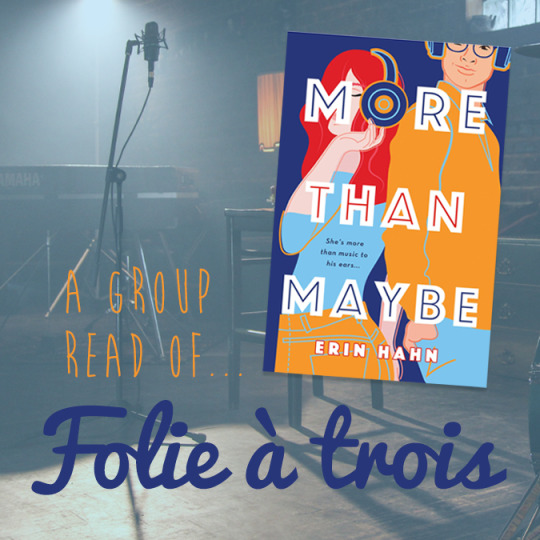
Folie a Trois: a group read of... More Than Maybe by Erin Hahn
The supporting characters
Ariadna: From Zack to Meg, Phil to Marcus... I really liked that the supporting characters had background and depth... for a YA romance novel, that it is. Ok, they are not the deepest, most exceptional characters –they are a little bit stereotyped, and everything is sooo rose-coloured tinted–, but I appreciate how the relationships between them are depicted and how every one of them has their own unique quirks and background story. Nevertheless, I must add... I think Hahn’s attempt to make all the characters these goody-two-shoes has made some characters sort of a decaf version of what they should realistically be, see Charlie Greenly, Phil Josephs, Cullen... At times they were so soft they became even boring to me. I understand Hahn’s religious views, but honestly, no one is that good.
Alicia: I liked the supporting characters quite a lot, actually, all of them. In many young adult novels you find rather flat secondary characters that only exist to complement the main characters, but not in this one. All of them were complex, with their own defined personalities and their own stories. There were a few moments when I got a bit irritated by someone's actions, Cullen uploading Luke's song behind his back, for example. But real people are flawed and make mistakes so it's only fair that fictional characters do, too.
Marina: First off, I have to say I loved all the secondary characters. I have to agree with Ariadna though, they are not overly deep but they get you right on the feels. I especially enjoyed seeing the different relationships between them –Zach and Cullen <3–. To be honest I found it a bit frustrating that they all kept telling Vada how amazing she is and how well she’s doing but it takes Luke, a person whom she’s officially met recently, to stand up to her dead-beat father. Talking about fathers, Phil is an amazing father figure and I’m really glad he at least encouraged Vada to follow her dreams. On a side note, can I just say that the first time I read about Cullen and Zach I pictured a more lanky version of Emmett Cullen dating Zeke (from high School Musical)? And that’s why I found it hilariously amusing when they started talking about Teen Wolf. Whatever happened to those DVDs?!
The ‘Bad Apple’ club aka Charlie Greenly
Ariadna: We all grasp to certain extent how business —corporate, big-money businesses— work, and it is understandable Charlie’s nasty partners took advantage of a teen’s rage burst, but, oh, man, how it bothered me when they tried to ruin poor Phil’s fund-raiser... What bothered me the most, though, is how Charlie Greenly was that blind, how he couldn’t see, beyond his own interests, how important the Loud Lizard was for Luke, his friends and for Ann Arbor, or to what extent the whole ‘Break for You’ issue bothered his own son. I honestly think his heroic act at the end doesn’t quite redeem him of the harm he has done. Besides, Charlie was supposed to be a Punk-rock star... What’s really left of that personality? Has her wife and kids completely transformed him into a dull wimp? Not quite believable, this character is.
Alicia: Charlie made me so mad at him that sometimes I wanted to throw the book across the room. I understand parents always think they know best, it's in their parent DNA. But it was really frustrating and irritating how he kept trying to get Luke to do whatever he wanted, without considering what his son actually wanted. He kept trying to convince Luke to do something he had stated time and time he didn't want to do and was not going to do. He used him for his own interests and treated him kinda badly just cause he didn't fit with his own expectations for him. Realistic as it could be for most people, it's still shitty. It's almost cathartic how he redeems himself at the end by quitting Bad Apple to support his son but that doesn't change his shitty behavior towards Luke during most of the novel.
Marina: I mean Charlie didn’t seem the brightest of the Greenly family, to be honest. I think he should probably listen to his sons more (and his wife). I find it hard to believe he didn’t know what he was getting into. He was a famous punk-rocker at a time where you had to be clever and sharp-witted, like, is he smart enough to stay away from hard drugs and keep his career afloat (and later become an accomplished music producer) but not know how to choose business partners? Apparently. And talking about his previous life as a punk-star… Can he stop trying to live his life through Luke? It finally dawned on him in the end, yes, but throughout the book Luke (and later Cullen) explicitly told him he didn’t want to be famous, it doesn’t excuse his behaviour!
Soundtrack
Ariadna: While some of the tracks on this book’s OST are not my cup of tea (see Demi and Taylor), I must confess: I’ve been listening to TøP the whole week. Hahn got me at Car Radio *shrugs*. Working in the book industry, I’ve always felt books, when possible, should offer something extra. I really love that this book, even more considering it is addressed to teens and YA, offers this little something to connect it to the readers’ real world, to make the story even more realistic. I think it is a loss that the book itself doesn’t include a QR code or a link to a playlist itself, but it is an easy search away in Spotify, thanks to some nice reader that has already put it up!
Alicia: I just had this one little issue with the music/artists mentioned in the novel: Vada hates Stevie Nicks and consequently I hate Vada. There won't be any hate towards Stevie Nicks in my presence. She is an excellent artist and I will not hear otherwise. Other than that I actually loved how important music in general is in the novel and how many real actual songs are shared along the story. I expected to find mostly alternative/indie bands so there was no surprise there. And music can tell a lot about someone so it was interesting to see the music Luke and Vada listen to, to understand them better. Also it was really nice to get so many songs in so many different styles to actually discover new songs myself. I'm really happy about how music really does play an important part in the book.
Marina: I’ve mentioned I like it when authors add their little soundtracks to the books but this one goes far beyond that. You get to listen to the songs throughout the characters’ actions and feelings and the music is not only an add-on but it becomes part of the plot. Which, granted, it’s a book about a girl who writes reviews about bands and a boy that writes songs, how can music not be part of the book? But it goes beyond the “here’s a song that inspired this chapter/book/scene” to a basic subplot. Coincidentally, we all looked up different songs on Spotify because we hadn’t heard them before and we found a playlist made by a reader, we hope you enjoy it too!
Vada and Luke’s relationship
Ariadna: It is interesting to read a YA romance novel in which the main action doesn’t revolve 100% around the romance. It is way healthier than most: both Vada and Luke have clear goals and motivations that are not biased by their relationship, they motivate and encourage each other, there is no narcissistic chauvinist - submissive flower dynamics going on —thank the gods–, and they are supercute and honest with themselves. However —I always have one of these–, it is still a naive teen relationship, mostly in terms of the plotting and the writing. Surprisingly —see the irony— they both have had crushes on each other for years, but they haven’t acted upon it until now. They NEVER fail, get mad, do any bad deeds... ANYTHING. Are they even teenagers? Honestly, I hate when the characters in a book are these holier-than-thou perfection vessels. Added to the not-really-that-big-of-a-deal problems (what happened with the instagram issue? What about Vada’s funds for college? They don’t even really get *really* mad because of the Bad Apple thingy...), they feel kind of bland and not too realistic for my tastes.
Alicia: At the beginning I thought it was a bit rushed, how quickly they trusted each other considering they had barely interacted before. Even if they had a crush on the other that doesn't mean they actually knew that person, not really. As they spent more time together and got to know each other, their relationship evolved pretty organically and naturally, to a point when it just made sense. It was really cute to see how they got closer through awkward encounters and how their passion for music helped them connect and relate to the other. Having read many young adult romances, it gets old very fast. The stories get kinda predictable and hard to believe. This one also had some predictable moments, almost all of them do, but overall it was a really nice love story, one I could actually believe.
Marina: To be honest, I expected this book to be less about the music and more about the relationship between Luke and Vada. I think what Erin Hahn accomplished in this book is to show a much more mature relationship than I expected. I thought this would be your typical YA-Romance with a lot of drama and kissing, but instead I got a slow-burn story (so slow, it felt like moving through molasses) with depth, insecurities and, yes, drama. I think both these characters are more mature than expected on a YA romance novel and it was surprisingly refreshing. You still get some teenage-y sub-plots, i.e. the prom or even the 15-minutes of fame; but it doesn’t take away from the blossoming relationship between Luke and Vada.
The Grass is Greenly and Behind the Music
Ariadna: I must be growing too old for this s**t, but I don’t get the whole podcast/blog thing. I get it, social networking does this kind of thing: turning a nobody into an internet sensation in a matter of days, but... I agree with Alicia, it is too much of a coincidence (one of the deus-ex-machina I so much hate) that both the main characters are internet-known... in a blog, nonetheless! Maybe Hahn could have used precisely this internet presence to make Vada and Luke meet each other, instead of the too-worn-out high-school cliché. And Marina has made me think... maybe some interludes as Cullen’s podcasts, letting us know some behind-the-scenes gossip (The Lindsay issue, Luke and Vada’s first kiss becoming viral, and so on...), would have spiced up the novel a bit more.
Alicia: Okay here's the part I just didn't believe and kind of threw me off a bit. What are the chances of a music blog and a podcast, both run by teenagers of the same age in the same city in the same bar, becoming really popular and actually viral. Who even reads blogs anymore anyway? (Says while writing in a blog). It was just quite hard to believe so many people read Behind the Music that even ROLLING STONE became interested. Yeah sure this extremely known successful music magazine wants a fresh out of high school blogger to work for them. And then the podcast. What could two teens have to say to have a podcast so popular that when Cullen uploads Luke's song it literally gets millions of reproductions and attracts attention everywhere. And both of them being run by two people working in the same place, going to the same high school… the world is not actually that small. Sorry it's just kind of extremely unrealistic and didn't particularly like that part.
Marina: Seeing the “behind-the-scenes” of the day to day of a podcast was very interesting. I guess it would have been better if Cullen told the story as he is the one that does most of the work. Also, how did they get that famous? Is it just because of their dad? I don’t really get it. On the other side, I find it incredibly unbelievable that a teenage girl has that much input on a music blog that isn’t even hers and gets to go to concerts and stuff like that. I get that Phil is a cool guy but how come the blog is so famous and he doesn’t really care about it or mentions it much during the book besides sending Vada places? I just don’t understand that.
Overall
Ariadna: Honestly, I’m not one for YA romance novels, I think I’ve outgrown them by far, and they usually bore me. That said, this book has surprised me for good. It is a light read, doesn’t follow the genre clichés, it doesn’t make everything revolve around the main characters’ love interest, the supporting characters have personalities of their own and it has a wide-ranged well-put playlist, which I think is great for teens and young adults to read. I particularly didn’t like the religious issues coming up from time to time, but, overall, this is the best written book of the three we’ve already read for Folie a Trois, and that’s a lot to say!
Alicia: Overall it was a really cute book. Initially it took me a while to get into it cause the plot wasn't exactly what I thought it would be, that was a tad disappointing. But then once you begin knowing the characters and they begin to know each other as well it's quite captivating and easy and quick to read. I really enjoyed the love story, I loved how diverse the characters are and how they interacted. I really like how the plot develops, too. If you're looking for a soft, cute, easy enjoyable read I definitely recommend this one.
Marina: As most YA books that I read, it was entertaining but it didn't change my life. I really did like Vada and Luke's relationship, as I said I find it more mature for this genre; the music was a big highlight and the drama wasn't overwhelmingly dumb (as is the case in some other books). Overall a good book for summer and a light read for any other season ;)
#folie a trois#group reading#group read#goodreads#feel good#music#romance#love#ya#ya book#young adult#ya novel#more than maybe#erin hahn#book#beach read#readers guide to the universe#rg2universe#rg2u
6 notes
·
View notes
Text
Eren the Free, Part 1: Response to linkspooky’s ‘Eren the Slave’

Thanks for asking for my response, anon, because it has allowed me to string together and articulate my own thoughts on Eren’s character at this stage of the story.
Needless to say, I have several interpretive, philosophical disagreements with @linkspooky‘s ‘Eren the Slave’ and these are expressed in my ‘Eren Jaeger – Who Freer than the Tyrant?’ meta, so please read that first. The purpose of this post will be to argue against specific claims made in linkspooky’s meta and tackle what I believe to be logical flaws in my opponent’s argument. This meta is in two parts not to flex but because my computer had an aneurysm trying to load the whole post.
Well, if the Defence in the trial of Eren Jaeger may take the floor, my opening statement is thus: Eren is no slave, and has pursued the path of freedom further than any other character.


Narrative and Personal Narrative
linkspooky draws a distinction between the Narrative of the manga and Eren’s Personal Narrative, the story he tells himself. They argue that people who have faith in Eren’s self-conception fall into his personal narrative.
But is his story not a Narrative? It is quite natural to expect character development from characters in a story - it could only rightly be called a mistake when it comes to real life. And do Eren’s detractors not themselves fall into the Personal Narratives of Armin, Mikasa and Zeke? They have repeatedly made the statement that Eren is not free, that he is being controlled by Zeke or Grisha, and every time he has proven them wrong.
There is indeed an authorial Narrative separate from the characters’ Personal Narratives which can be detected through symbolism and the course the story takes. I find that the course of the story thus far lines up far more with Eren’s Personal Narrative than it does with those of his detractors. We can tell this from how he has disproved Armin, Mikasa and Zeke’s accusations of manipulation and also how, in the last chapter, he symbolically rips free of his chains.

There is also the fact that we the readers are more in the dark about Eren’s thoughts and intentions than we are about any other character. How could we be seduced into a Personal Narrative we know next to nothing about? And why would the story deliberately hide from us the very perspective that is meant to deceive us? I think it is far more likely that the reason Eren’s intentions have been shielded from the reader is because they take the nature of a terrible truth that must be dug up with bloodied hands.

Whenever Eren opens up about his thoughts and feelings, the meta unfairly dismisses them as mere lip service despite Eren having no reason to lie to Reiner and Falco as two people he intends to kill.
Rather than our side of the fandom being deceived by Eren’s Personal Narrative, I find that the opposing side dismisses it out of hand because they have no intention of listening to Eren’s side of the story. Why is Eren’s perspective less valid than anyone else’s, especially when he knows more than every other character by virtue of his ability to literally see the future?
The only explanation I can find for this attitude, if I may be forgiven the presumption, is that people approach the topic with the automatic assumption that what Eren is doing has to be wrong instead of questioning their own morals - which is, after all, what Attack On Titan is all about.
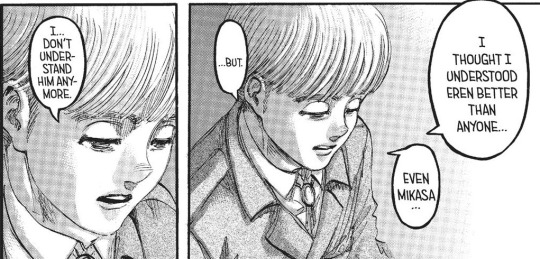
Armin even says that he no longer understands Eren. I don’t think we should trust the perception of a character as being authorial Narrative when he explicitly makes a statement like this. linkspooky does have an explanation for this scene, however, which I shall address in the next part.
Armin and Mikasa’s Perceptions of Eren
linkspooky claims that the reason for Armin’s confusion is that his romanticised view of Eren is falling apart, which indeed it is, and the same is true of Mikasa. However, I don’t think it’s right to claim that their new perception of him is an accurate one, since they still haven’t heard anything from Eren himself apart from what both I and linkspooky agree are lies to distance himself from them.
While they both once focused excessively on the positive in Eren, now they focus excessively on the negative, not considering the reason for Eren’s actions that I believe we have received hints of in the last two chapters.


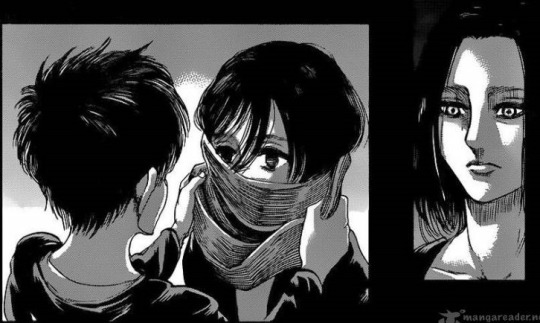
linkspooky and I both think that Eren wants to protect his friends - in my case I most definitely see it as his primary motivation. If Armin knew this about Eren, I do not think he would condone him, but I don’t think he’d so roundly condemn him as he does here either.

So I don’t think it is right to consider Armin’s words the straight truth here, given the lack of information he’s working with, and that indeed, the fandom is working with. Because Eren is doing the most morally questionable things, and because we are seeing things more often from Armin’s perspective than his these days, there is perhaps an impulse to put faith in Armin’s words over Eren’s. But in this series, nothing is ever so black and white.
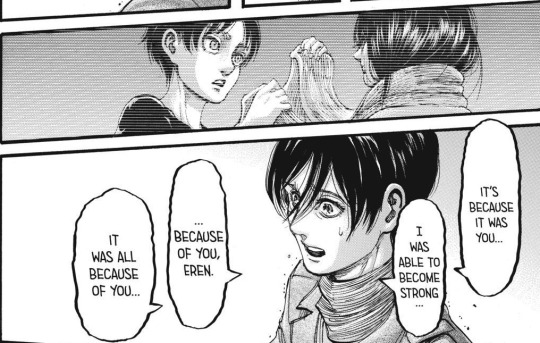

In Mikasa’s case, her treasured memory of the scarf is now being being challenged by the memory of Eren murdering the kidnappers - but we know from 121 that Eren places special value on the scarf as well, instead of just the murder.
Rather than trying to paint Eren in a white or black light, they need to see Eren as he really is: like the freedom he represents, a force beyond good and evil.
Enemy of the World
One of linkspooky’s arguments is that being the ‘Enemy of the World’ is just Eren’s fantasy as he frequently relies on others. However, linkspooky also mentions how Eren manipulates everyone close to him. I would argue that the person who manipulates you is, in fact, your enemy, and that Eren is the Enemy of the World not because he never relies on help but because he is entirely on his own side.
Indeed he knows that assistance from others is necessary even just to activate the Founder’s power, and he also refers to the Survey Corps as his friends, or even comrades, depending on your translation.

This is why he manipulates them - and the reason he manipulates rather than relying on them is because he feels that his Will contradicts the Wills of everyone around him. There is no-one who desires the outcome that Eren desires, not even Floch and the Eldian nationalists, I believe: I think even they will baulk at the scale of destruction Eren intends. Historia is the only character I think may be an exception to this rule as the other bearer of the ‘enemies of mankind’ moniker.

This otherwise total isolation of intention is what makes Eren the Enemy of the World. Because he fights for his freedom, he rebels against peace.

I think this panel is another example of why the authorial Narrative itself supports the idea of Eren being an Enemy of the World. The positioning of the speech bubble and outside text was entirely the decision of Isayama and his editor, and is not a thought bubble from Eren’s head. He has never actually addressed himself as ‘the Enemy of the World’: Historia calls him the enemy of mankind and Willy says he rebels against peace, but while Eren has said he “might just destroy the world” and only in response to Willy’s words, he is still not ascribing himself a title or role.
Eren’s Individualism
linkspooky claims that the scene in the FT arc, where the Levi Squad is slaughtered because Eren didn’t rely on his power instead of theirs, is misinterpreted because Eren also lost the fight on his own. However, this is where I think this meta falls prey to one of its greatest weaknesses: the omission of the Uprising Arc from the analysis of Eren’s character, wherein his most pivotal transitions take place.
The event that caused Eren to trust in his own strength over the strength of others was not his fight against Annie, but when a similar situation repeats itself in the Crystal Cave.

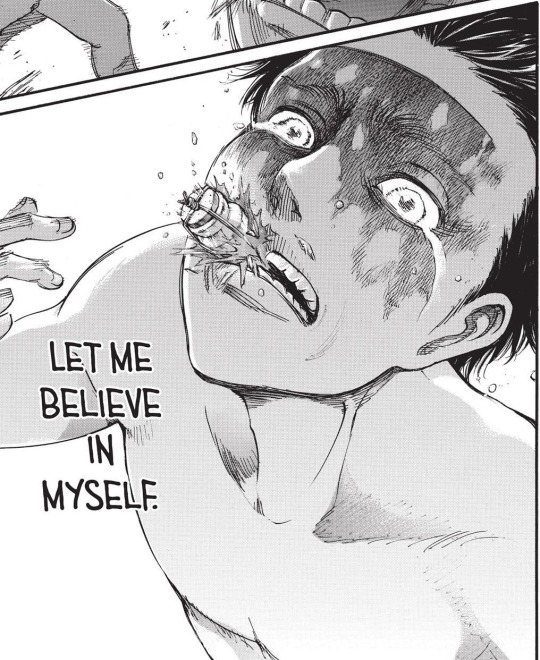
In this circumstance, Eren is able to protect all of his friends by relying on his own strength, when they would have died had they attempted their risky manoeuvre. Eren has become strong enough to protect them on his own - this was the first inkling of that realisation.
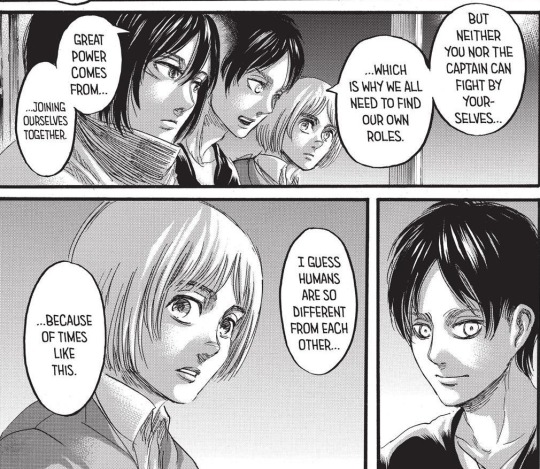
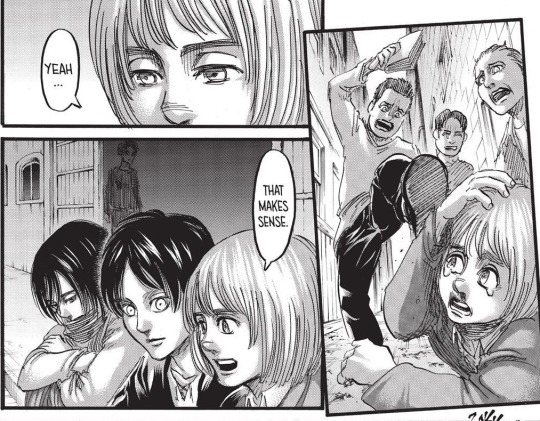
I say ‘first inkling’ because Eren does say this afterwards, which seems to influence Armin towards his current ideology. Such an idea seems at odds with what I believe to be Eren’s current aim to genocide those different to him as a wholly antagonistic force, like the bullies in Armin’s memories who Armin now wants to make peace with.
I believe this is because Eren soon learns that those differences between people are simply too great and too much of a threat to his freedom. People are stronger together, but only if he can be confident that they will follow his Will, which is how he learned to manipulate his allies. The differences between him and Levi in the Serumbowl nearly caused the loss of his best friend, and then, when he receives Grisha’s memories and learns of Marley’s treatment of Eldians, he learns just how deeply divided humans are and loses faith in overcoming those differences.

Far from character stagnancy, this is the development I see in Eren that has led him to this individualistic conclusion.
I would also like to address what I think is a fallacy in linkspooky’s analysis of the fight Eren loses against Annie. Eren loses both with his comrades and without them - how does that make the former path any better than the latter? Eren was actually doing very well in his fight against Annie, and only lost when he realised her identity from her fighting stance.


What I think Eren really took away from that fight is the lesson he is applying now - he cannot show any mercy to his enemies.
Levi Parallelism
I find the parallels drawn between Eren and Levi quite interesting and am not necessarily opposed to it, but personally I find that Levi has more parallels with Mikasa than Eren as two Ackermans driven by their love for others (though of course this is a big part of Eren’s motivation as well). Mikasa realising she can’t protect Eren or always be by his side is more in line with Levi accepting that he can’t save everyone imo.
Those Who Push Themselves into that Hell
linkspooky draws attention to Eren’s use of language to indicate that he is not free, such as in the following scene:

They argue that the ‘something’ pushing Eren along means he is not moving from his own will.
However, I find this claim to be contradicted by the distinction Eren makes within this very scene. He differentiates between those who are pushed into hell by their circumstances and those who “push themselves into hell”, clearly putting himself - at least as he is now - in the latter category. So I find that Eren is articulating that, because his whole past and future are manifestations of his own Will (as I argue in the attached meta), he is freely choosing to enter this arena rather than being forced to do so.
I Just Keep Moving Forward
linkspooky also argues that the reluctance in the line “I just keep moving forward’” suggests a lack of freedom. I would argue that continuing to fight for your goal even though you are frightened is a sign of strength of will rather than the reverse.
They also argue that, because those words are remembered as Reiner is about to kill himself, they are portrayed in a negative light. But this omits the crucial follow-up to that scene, where Reiner does not kill himself and finds a reason to live after hearing Falco express his desire to protect Gabi. Reiner is saved by that will to keep moving forward.

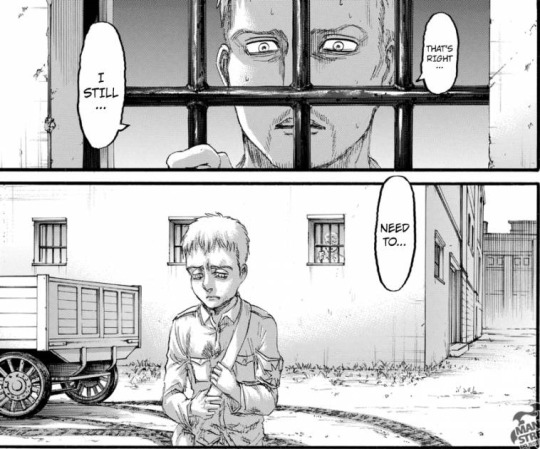
They further argue that Eren takes these words from Hange and twists them to suit himself.

But this is untrue. As they pointed out themself, Eren first heard these words in his training days from Reiner where it did mean what he thinks it means. Furthermore, there is no panel showing Eren having any special reaction to Hange’s words. He is shown with the other key Serumbowl players before Hange says them, but not afterwards, where the focus is solely on Mikasa.

I believe Isayama has Hange say Eren’s tagline because it is a key phrase in the themes of the story, and not because it has any special effect on Eren.
I Didn’t Have Any Other Choice
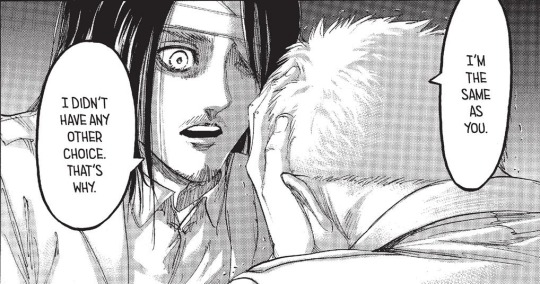
Lines such as “I didn’t have any other choice” and “Is there another way” are similarly argued to be indicative of Eren’s enslavement to a single course of action.
But this is just the conflict between long and short term gratification – enduring hardship to obtain your goal is an example of a strong will, not an enslaved one. Even if he is enslaved to circumstance, this is the case for everybody else as well, and it is an enslavement he seeks to permanently free himself from by crushing his enemies for good. After that, he and Eldia can do whatever they will.
Born This Way
The lines “I’ve always been that way, ever since I was born”, and “It’s probably been like this since the day we were born” are argued to be a form of enslavement to one’s sense of self. I cover this in my attached meta, where I argue that it is rather an affirmation of his own Will and right to exist.
One specific point I’d like to address is the claim that Eren saying those words after Reiner tries to take personal responsibility for his actions is evidence that Eren is running away from his guilt, and is therefore not at peace with his actions, and is therefore not free. But rather than in denial or frustrated, Eren appears to be in a state of sad serenity.


Eren does not say these words in immediate response to Reiner, but only after he hears Willy say “Because I was born into this world”. I think that here Eren is simply recognising that Reiner was simply following the unique nature of his Will - doing it because he wanted to, not because he had to, which is indeed what Eren is doing - and acknowledging that it is something he cannot criticise him for, but also something that he cannot spare him for. That is the command of Eren’s unique Will.
As for Eren not being at peace with his actions meaning he is not free, refer to the short/long term gratification point I made earlier.
Jealousy of Mikasa and the Need to be a One Man Army
linkspooky claims that Eren is still trying too hard to be as strong as Mikasa and Levi, but once again the meta suffers due to a lack of consideration for the Uprising Arc. In that arc, Eren got over his jealousy of Mikasa and Levi and explicitly stated as much.

This, I think, is also sufficient evidence against a persisting desire on Eren’s part to be a One Man Army (as opposed to freedom, which he does have a desire for). His words here make it clear that he wishes to fight alongside his friends if possible. He has simply learnt that, to achieve his goals, ruthless manipulation and rugged individualism is necessary.
Need to be Special
This is also something Eren overcame in the Uprising Arc. He thinks of himself as a normal person, the son of a special father, that he never needed to happen.


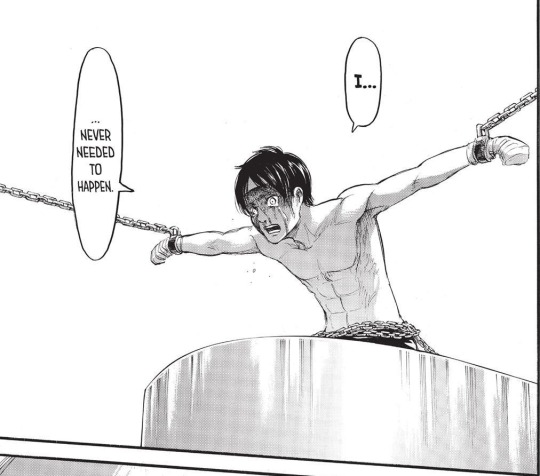
He is not doing all of this to be special. He has simply become special by pursuing his birthright: not a birthright of exceptionalism, but of the right to exist, something I shall explain further in the ‘Meaning of Carla’s Words’ section in the next part.

As with the One Man Army, it is a matter of necessity rather than desire. I cover this more in my attached Eren meta, but Eren’s character has developed in a perfect loop. Though his actions remain the same, his understanding of them has increased dramatically: that is to say, he has come to understand himself.
Indeed, people are not naturally special. But can one really argue that special people do not exist at all? To say such a thing would be to argue that there is no difference between Daz and Erwin. People become special - Supermen, to reference Nietzsche - because they relentlessly pursue their Will to Power, their driving force to actualise their desires.
linkspooky also argues that the reason Eren’s change is the most dramatic after the time-skip is because in actuality he hasn’t changed. My argument is that it is simply the result of having the most explicit and tumultuous development in the story up to now, and crucially, the ability to see a future no-one else can.
Read the rest in Part 2 here!
#shingeki no kyojin#eren jaeger#eren yeager#snk meta#meta response#snk spoilers#aot spoilers#I haven't directly quoted since I was asked not to#but I hope it's clear I'm arguing in good faith#Also @ls please feel no obligation to read this behemoth#It's a ridiculously long response
124 notes
·
View notes
Text
if you don’t want to talk about racism in media, you shouldn’t try teaching racism through media
(or: using minority exploitation and suffering to teach minority exploitation and suffering by appropriating a movie that appropriates minority exploitation and suffering.)
(CW: brief discussion of rape in the movie “Gran Torino”, also spoilers for said movie)
I’ve recently been having a lot of flashbacks to elementary school, kindergarden and I am still pretty much scarred from high school, so let’s talk about the usage of media in high school and the utter lack of care or competence on the side of some of my teachers.
We watched Clint Eastwood’s “Gran Torino” in English class and thinking back at it, there’s a lot of stuff that we didn’t talk about which would have been very fundamental to understanding media, so let’s start with that.
Who are hero and villain? The hero, Walt, is a old, white veteran played by Clint Eastwood. He starts off as a racist and “learns his ways” by interacting with a Hmong minority that moved in next doors. He helps the youngest son to “man up” and eventually dies in a crucifixion pose saving that family. If you wanted to be cynical you could say he’s the manifestation of a white saviour complex and toxic masculinity... The Hmong family next doors basically consists of a mother, a son and a daughter. The son is a little bit of a nerd and his cousin (named “Spider”) tries to force him into joining a gang but he refuses. That conflict culmulates in the gang shooting at the house and raping the sister.
So, as we go on to discuss several rather problematic aspects, keep in mind that we talked about none of this in class even as I asked the teacher about it. Before we even start off: Walt constantly refers to minorities with a racial slur and it is never addressed. Neither in the movie or in the classroom we watched the movie in. And maybe that makes sense within the movie’s internal logic but your main charachter, who you, the writer and teacher, chose to portray as a hero still uses a whole bunch of racial slurs and it’s frankly amazing that you don’t talk about that a lot. Like, the really stupid analysis would have been “Oh, he uses a lot of racial slurs in the beginning but then stops using it as he becomes less racist, it’s character development!”, but he never once apologizes for them, he never once gets corrected or gets told how hurtful those are. Why not talk about it?
And ultimately this is a lot about the choices you make when telling a story, who you decide to be a hero and frame in a fucking crucifixion pose, who gets to be the villain and what means become important.
Speaking of the villain: The villain is literally a part of a Hmong family, like the gang is framed in the most ridiculous light as they drive their pathetic car while listening to “fuck the police” but they get very cruel very fast as Spider shoots the house of his aunt and rapes his cousin with his friends which makes them quite abominable and barbaric. There is deep cutting sexual assault but it’s nothing but a means for Walt and his little apprentice to get upset and seek revence. You could probably substitute a literal gang rape for like burning a house down, or stealing some precious thing, it’s just weird that they chose to make it sexual assault. The sister, throughout the movie, takes a role in the background and kinda just naggs her brother, teases him and tries to banter in the most annoying way possible. And then she gets raped and if you think too hard about it, it seems a lot like her character was developed to serve that narrative purpose.
The movie also talks about the problems this Hmong community is facing, but it also kinda shows them as comically evil, there is no question who the good guy is - and who the bad guy is. What I am getting at is: why is the villain a Hmong gang and not.. I don’t know, the police? Gang violence is a huge problem for minorities - police violence is too and one kind of doesn’t frame an entire ethnic group as in need of help or barbaric. And yes, gang problems do exist in real life, but the active decision to depict it instead of the inherent flaws in the socio economic system that has enforced centuries of discrimination, is the important point. Interestingly, the movie does address the utter uselessness of the police briefly and kinda advertises the anarchist “taking things into your own hands” approach. As real as gang violence is, such is racial profiling or the fraud system - why not talk about it? Because that makes the black and white distinction of heroes and villains get a little fuzzy and who would want nuanced and complex themes?
Masculinity is used in connection to power tools, weapons and old but fancy cars. The son of the family (I forgot his name) is smart, he wants to go to university, he helps his mother, he is emotional but that doesn’t matter. And maybe that’s a very self aware take on “all of these qualities don’t matter but as soon as he has his own tool belt, he gets validated from society” but for that to be the take, they focus way too little on the validation or the previous value of his person - the validation becomes implicit and he is mostly validated through Walt. With that: there is not a single strong female character except for the sister in there and that would be generous considering what happens. Thinking of it, here are like three whole female characters in the entire movie.
Let’s get to the weapons. It’s no secret that Clint Eastwood is a conservative and it’s also a huge gimmik of the movie that “the only thing that can stop a bad guy with a gun, is a good guy with a gun” - no question asked about gun control. Guns are the cause for a lot of pain in the movie, but the hero is constantly glorified for his use and ownership of weapons, so there is absolutely not critical thought towards that one. Since Walt is a veteran too, there is a dash of at least value in military accomplishments too.
You could definitely argue that not all of these things are explicitly in there or that it probably wasn’t the intention of the screen play writer - but it still matters for media understanding to be aware of all of that. Of the fact that decisions are actively made and those are inherently political. Whose story you chose to tell is an observation that is incredibly crucial. You could also ask why I even bring these complex topics into English class? I mean, it’s high school. And I definitely agree that these questions cannot be talked about in a usual English class - but then tell my why my teachers wanted to talk about them soooo bad. The whole overarching theme of English finals was “belonging”, especially in contrast of its opposite of discrimination. They try so hard to make English skills about important social issues - they just fail doing so.
I am fully aware that the movie “Gran Torino” is just a means to teach the English skills necessary to pass English finals. They want you to learn about the history around the movie, cherry pick their way through topics they can get into 90 minute sessions, mostly avoiding debates about the movie tiself. I am fully aware that discussing racism in English class doesn’t aim to talk about these problems but to teach you the skills you need to pass finals. And that makes me cringe very hard because that means they’re quite literally using painful experiences to do that without having put a lot of thought into that.
One of my worst ethics teachers couldn’t tell me why I should care about Immanuel Kant’s work when he was this massive racist and sexist. He couldn’t tell me. And it is important to reailze that either he doesn’t have the capacity to think about that or he didn’t care enough to ask himself that question and I don’t know which one is worse. The same goes for chosing a movie that glorifies masculitiny and a white saviour to teach about belonging. Why not talk about the fact that nearly 50% of all homeless youth in the US is LGBTQ+? You need to be able to justify the decisions you make and the reasons why you don’t talk about certain things - and if that reason is called what the ministry of education tells you to do, they should have come equipped with an answer!
So. Why care? I love taking examples a ad hitlerum because that makes people realize the importance of the situation. If we were to read Mein Kampf in class, you would want the teachers to be a) able to understand the underlying problems of the material and talk about it to students and b) able to justify why the fuck they are reading Mein Kampf in class. I’m not saying Immanuel Kant’s ethics and Clint Eastwood’s “Gran Torino” are as bad as Mein Kampf, I’m saying that these are the kind of questions you have to ask yourself as an educational institution when teaching and chosing things worth teaching.
2 notes
·
View notes
Link

Chapters: 1/1 Fandom: 방탄소년단 | Bangtan Boys | BTS Rating: Explicit Warnings: Creator Chose Not To Use Archive Warnings Relationships: Park Jimin (BTS)/Reader Characters: Park Jimin (BTS) Additional Tags: Angst, Smut, Fluff Series: Part 1 of The One with the Tropes
Summary:
You’ve only bared your body to Jimin, mostly silent after the act. The one time you do, you find yourself baring your soul to him, far more than you bargained for.
OR
(the fubu trope)

“Will you play with me?”
“What kind of game?”
Fringe, my love, if ever you get to read this one day I want you to know that everything you write is precious and I’m thankful you’ve gifted us with Ineffable, this is my favorite Park Jimin fic, there’s something about the way you write that always pulls me in and after reading your note about being single (when you wrote this) as the inspiration for this fic, it hit me hard and made me understood why I was so affected because just like you I miss the feeling of intimacy too.
[SPOILERS AHEAD ~ because my feelings are unstoppable]
it’s been a while since I read something that made me feel like there’s a literal hole in my heart, I love Kim Seokjin to the moon and back so reading and immersing into this as his Bestfriend for the longest time, pining hardcore for him and everyone knew but the boy was too was blind to see it, fuck it fucking hurt, god, the amount of angsty emotions this pulled from me was no joke, I became so sensitive and grumpy to people around me as I was reading this, Seokjin was too beautiful, too perfect, but also dumb and dense to not see love in her actions and words for him, I was frustrated the whole time and he really had to give her cup to that brunette (I will address her as brunette through and through because I’m petty like that)
do you believe in fate? Jimin, he was a gift from fate, he always manages to be there for her just when she needs someone to save her from the pain Jin causes her fragile heart, at first he was a stranger in a crowd but they found each other, he was a welcomed distraction because for the nth time she failed in confessing and pouring all her love for her best friend. everything happened so fast, one moment she was sulking over her love and a certain brunette, then she’s asking the pledge to fuck her, she needed to feel something else, something that will make her forget (and regret) she was cold towards the boy because she knew that was it, a one night stand that doesn’t require any cuddling and ego-stroking, a quick fuck, self-pity and a few text messages later I felt bad for her, she had no choice but to dive in and pick anyone up to her challenge and it sucks because she felt guilty for something that doesn’t have any repercussions she was a single grown-ass woman who could date, fuck, and dump whoever she wants, but it’s Jin, her constant, it’s always him (but it will never be her)
fast forward to more encounters with Jimin, fate really wants to test her huh, was fate cruel? first, sharing a class with Jimin the boy she avoided like the plague, then meeting Jin only to listen to him talk about the brunette with so much love it pricks my heart like a bitch, my eyes were rolling at the whole cafe conversation, please just shut up Jin... then the party, ugh, I hated Hoseok for not even showing a little interest or respect to MC, she’s human too and Jin’s BFF but I guess they were much more interested in meeting the pretty, sexy, cutie whatever brunette, like what makes her special huh? pft but thank goodness MC has her own personal hero in the form of Park Jimin he saved her once again, even if she explicitly told him it’ll never happen again, my whole body tingled when she gave in once again because the boy is packing some wild stamina, feelings were developing and as much as I love and adore Jin, Ineffable Jimin whisked me away, he clearly has a soft spot for MC, he cares about her, studies her little quirks and pays attention to everything she says and do and this time she was the blind one, he may not be as hardcore as here when it comes to solo pining but he’s getting there, the way he pleases her and begs for her to stay was evidence but the stubborn cold-hearted girl won’t budge saying it’s the last and it’ll never happen again but upon discovering the information that he will be practically attached to Jin’s hip because their buddies leaves her without a choice but to accept that Jimin will always be there.
now their own game starts with a few rules no small talk and no way he could talk about her with others and he happily complied (what a tsundere babe) even if she finally has someone to soften the blow, Jin had to wreck her heart through and through and I hate it, I hate Jin, and I hate that brunette, but despite all the hate brewing in me Jimin was there once again to rile her up it was funny not until somebody had to dampen her mood once again, sigh, everything happens for a reason and Jin always hurts and pushes her away but she keeps clinging on to him, part of me thinks that more than liking, loving, and considering him as her constant, she sees Jin as her home, she had a rough life and he’s always been there, but she needs to let go and detach herself to let other people in but damn her grip on him was too tight, her hopes still burning bright that one day Jin will look at her the way she wants him to see her...
oh god I literally summarized everything but this is the best part, the part where you need to hold your heart from all the fluff, the angst and soft genuine smut (because the first two smutty scenarios are rough and wild and just pure delicious smutty goodness *chef’s kiss*) Jimin has slowly become her constant, they finally learned a lot about each other slowly, the bits and pieces of information felt like they’re working on a pretty scrapbook supplying parts of them until everything makes sense, then Jimin came up with a new rule, sure they were content with the way things were but they ultimately decided and agreed to ranting while the other listens, I love how MC is slowly opened herself to Jimin, and how she started to smile and laugh again, something we never really saw with Jin, all he did was make her pine, hope, wait, sulk, hurt, and repeat, but with Jimin her life started to show patches of colors, he makes her happy, makes her smile, makes her warm, he worked his way up to be able to stay by her side even if he could’ve just ditched her now that he’s done being a pledge but he was in too deep to even let go.
everything was falling into place until she had to have her heart broken once again, srsly cried hard while reading this part moving forward, Jimin never questioned the game she wanted to play, to become lovers even for a short period of time, a borrowed time to make her feel for once that she belongs to someone, that someone can love the mess that she is, that she is worth all the love the world could give despite her flaws and all, the whole play scenario shred my heart to pieces because as much as MC thinks she’s hurting, she had no clue that Jimin is feeling the same too, she’s asking to be held, to be loved, to be someone’s universe when he’s right in front of her holding her until her broken pieces are put back together, loving every part of her even those she didn’t think were desirable parts of her for in his eyes she was perfect, and most importantly Jimin looks at her as if she was the universe he holds with his hands, beautiful, fragile, full of life and sorrow, but still lovely nonetheless.
she opened up, opened and pour her heart out to him trusting he’ll listen and won’t judge her, she finally lost the battle, the one she loved the most will never be hers, fate already made it clear with all the way he treated her only as a friend, the times she had to endure, listen, and support him whenever he falls for someone new, and the reality that he will be asking the love of his life to marry him on a whim, life is truly fucking unfair huh, but it really isn’t because it was never Jin to begin with... it was Park Jimin all along, he was never a distraction because that’s where he truly belonged, he was the center of her universe.
sigh after literally typing and spoiling a lot my feels got the best of me I cried then smiled again this really is the best Jimin piece I've read, it was beautifully written with every intention to soften someone’s heart and maybe open themselves to love again, because that’s what it did to me well it softened my heart but idk if I'm opening up myself anytime soon. I really adored Jimin’s characterization here he can be the cocky fuckboy who plays around but his loyalty to MC was something, he was whipped right away ig, he’s also very cute, persistent, clueless, and annoying at times, but god this boy was so loveable I swerved directly to his lane, the vivid descriptions of every scenario especially the smut appeased my sulky self because Ineffable Jin tore my heart to pieces but the best part here is when she asked to play a game with Jimin, god it was the most beautiful thing I read, she was so broken almost irreparable but Jimin stayed with her and made sure she feels his heart, his actions were so pure I will never get over it, maybe I do love Jimin, I denied it for the longest time and Ineffable is that fic that got me accepting and shouting all my love for him sighhhh, again, thank you for this Fringe, you and your works deserve all the love, now watch me bombard my friends with this fic so we could gush about Park Jimin 24/7. | 🍒🍒🍒🍒🍒
#a:fringesofsanity#t:ineffable#m:pjm#ft:ksj#ft:jhs#g:fluff#g:angst#g:smut#au:fubu#os#🍒💣#k:oral#LISTEN THIS IS MY FAVORITE PARK JIMIN FIC AND IF YOU WANT TO KNOW WHY ~ YOU SHOULD READ THIS T_T#a novel hsdfghajdsfgjkas skip if you're busy or have 0 energy reading a spoiler commentary ghdsfgdhsjgf#you will only understand all my ramblings once you indulge in fringesofsanity's amazing works#the amount of hate i have for the brunette is wow hsjfhjksaf still hate her for stealing jin but whatever in this universe he was never mine#I belong to jimin here and that's enough T_T#sigh the best part I will never forget it and won't shut up about it how can someone get a lover so soft and tender like jimin#but also keeps lots of condom with every intention to use it on MC?? god the loyalty kink is real jdshfjdsfhjdsfhdskfshjdfgjhsd#watch me fall for park jimin harder everytime i re-read this#this is my salvation ~ if you've read right of way you'll understand that this piece appeased every single sad soul at RoW's ending#if i have errors sorry y'all i'm crying smiling and sleepy and trying to make sense of the rollercoaster of emotions i went thru as i type
16 notes
·
View notes
Text
Ok I'm looking back on the MCU now that it's been a year since Tony died, and I'm looking back particularly at my favorite stomping-ground, CA:CW. I'd seen a post recently that said that Steve was "100% right". And I just don't get how you can think that. So here are some thoughts (which get pretty spicy at points, but I want to preface, I don't hate Steve as a character, nor do I think he was 100% wrong. I just have a lot of issues with how people react and respond to him and I need to vent.)
So to start us off: do I think the Accords likely needed revision so that they weren't so drastic with the power they would give to world government? Yes. But I think Tony had a very valid point, and for ONCE, the narrative actually backs him up. Explicitly backs him up, may I add, because that call-out scene in Endgame was fricking epic and much needed. The ONE time that the narrative does not outright excuse Steve's selfish stubbornness, people are still writing it off and giving him a pass! Not only that, people are blatantly ignoring the message of the film!! In my opinion, the film touches on many topics: one, how you should always consider the other perspectives, and that discussion is infinitely superior to conflict; two, how you can't make decisions for other people; but three, in contrast to two, you have to be willing to be held accountable for your actions (social contract theory) which coincidentally is something that Steve is NEVER willing to do (until MAYBE) in Endgame. And I think it's telling that people miss this message! The movie is not intended to have one person come out 100% right, it is supposed to show that you should never assume that you are incapable of being wrong, that there are always things that you will misunderstand, that it is important to be humble enough to listen to the other side and honestly evaluate what they are saying, that compromise is important, that you should choose your battles, that no one is perfect...the movie spends so much time showing that Steve is flawed and breaking the perception of him as some all-American hero who is selfless and would do anything for the greater good. It is INTENDED to show that he isn't perfect, that he makes mistakes, and that he doesn't recognize them and instead of reconciling, he makes a selfish and headstrong decision that has lasting repercussions...It's showing the danger of a savior/God complex. It's showing how we can grow too attached to an ideal, so much so that we are willing to overlook its faults and flaws and explain away everything that might be problematic. We have to reevaluate the voices we listen to, and whether it is appropriate to rebel against authority. There is a place for individuality, even rebellion, but there must also be a reason--and the decision made in this film by Cap was emotional, not reasonable. If thought out further, it could have become reasonable, but ultimately he opposed the Accords because he wanted to save Bucky. You can't reject accountability and submission to authority on emotional grounds alone; we need to be respectful of those who lead us, even if we disagree, and work to change the system from the inside. This whole film demonstrates how polarization leads to tension, which leads to conflict, which results in no progress and no benefit. The only true progress is achieved by compromise.
And that is something Tony was willing to do!! Tony was the character trying to maintain harmony and act in everyone's best interest, by listening to everyone, not just deciding for them that this isn't something they should be ok with (sounds a little overly authoritative, eh, Steve?) But Steve and Bucky gang up on him and beat him down, which I believe is a representation of what often happens when you feel strongly about an issue. You will associate with those who agree with you, and you will make the matter a personal one, so personal that you will interpret any disagreement as an attack. Tony (who can represent moderation in ideals here) is beaten down by Steve and Bucky (who can represent polarized "extremists"), and I think that's a good commentary even aside from politics that is being completely lost because people continue to insist that Steve was 100% right. No! He wasn't! That's the point! And you're 100% missing it! NO ONE WAS COMPLETELY RIGHT!! The important thing is TO LEARN FROM YOUR MISTAKES!!! LIKE TONY DID!!! TO CHANGE YOUR PROBLEMATIC BEHAVIOR INSTEAD OF ENTRENCHING YOURSELF EVER MORE DEEPLY INTO YOUR STANCE!! To grow and to accept that you were wrong and you made a mistake and you're sorry and you're going to take active steps to change your behavior and make reparations even if it's uncomfortable! To progress! To learn to step back and give others a chance to shine! To become humble! To learn quietness and compromise and strive for peace! All of these are things that Tony, across his entire arc but especially in this movie, has been doing and demonstrating and working towards, and for every step forward he takes, Steve's absolute unwillingness to budge from where he is becomes more and more evident, until it seems that in comparison he is going backwards, because we are growing and moving forward too, and we are leaving him behind. Is it any wonder that people don't like his Endgame ending?? It's because it seems selfish, and we think he should be past that by now. But he's not, and he never will be, because he looks at the road to growth and he says "No, you move." But the only thing that passes is time, and eventually we are SUPPOSED to realize that maybe that kind of perfect resolution isn't all it's cracked up to be, and maybe he's flawed, and maybe we are too, and maybe the only way to "get that life Tony was always talking about" is to try doing what Tony did, and actually live it.
#marvel#tony stark#steve rogers#cacw#meta#my meta posts#quality meta seal of approval#kay can i just catch my breath for a second#this sounds anti steve but it's not i swear i am just frustrated with how people misinterpret his character and write off his flaws#looking back now the journey is over: year one#steve salt#anti steve rogers#again not really anti steve! but someone requested i tag it and i want to respect them
1 note
·
View note
Note
Hi! I absolutely love your blog!!! You have great insights, and always rlly interesting thoughts! So I thought I’d ask you a bit of a hard question about one of my faves. Do you think Gakushuu actually has legit morals? Like does he really care about issues that don’t exactly concern him, like big-picture ones like prejudice, poverty, etc? Through the series, he comes across as someone who won’t act unless it’s in his favor, but he’s also human too. What do you think?
Aaaah thank you anon, this is really heartwarming!
Hmm, it is an hard question. Morals are subjective at least in part, so my excuses if I do come off as biased or subjective on that point.
I think one need to take a look at Gakushuu’s role on a storytelling point of view: if the Chairman is the antagonist to Korosensei as a teacher, then Gakushuu is his champion fighting for his ideology against class E. His problem is with the current head, not with the system.
And, indeed, the Roll Book says explicitly that ’the psychology of the strong was driven into him as he grew up’, which make sense given the Ikeda incident happened while Gakushuu was very young (Korosensei talk about Gakuho’s former teaching as being around ten years or so, which place could place the suicide at latest 8-9 years before the story, so Gakushu was 6 years old at best). In fact, one of his first signifiant lines is in chapter 51, that introduce us to the character (technically he was introduced in the last page of chapter 50 but oh well), which is… him saying he understand that class E must not stand above others.
I think we can at least agree on that, ‘the strong trample on the weak’ is hardly a ethical mentality, so we’re on to a bad start.
And not only Gakushuu thrives in this system, he profits from it: look at the contract he wanted class E to sign if they lost during the first end-of-term exam. He hides his actual goal in a list of things, but truly, it doesn’t bother him to turn class E into servants in all but name. If he’s willing to do that on a school level, there’s no way he wouldn’t do that once in a society. Early chapters Gakushuu is not a boy with a high moral standing.
Another thing that come to my mind when thinking of morals is the case of the other Virtuosos, specifically Sakakibara Ren. Please excuse me if I focus on him- there was a period in the fandom where he was the one popular Virtuoso (outside of Gakushuu) and people seemed to think he was some kind guy? So as a counterpart he became the one I most clearly remember as quite garbage, haha. Specifically, the way he acts around Kanzaki, putting his hands where he shouldn’t and wanting her to be his maid… and it all culminate in his future where it is said “He didn’t fix his philandering ways and this created an incident that very nearly ended in bloodshed. He reforms after getting lectured by Asano.” And it makes sense, doesn’t it? The Virtuosos all respect Gakushuu and would listen to him if he tried to change them. So, the fact they act like that during junior high… Doesn’t that mean Gakushuu is fine with it, as long as it’s not inconvenient to him? He doesn’t mind one of his friends treating women poorly, unless that end up in ‘nearly a bloodshed’. That’s not a good sign in terms of morals…
I also think, but that’s outside of ‘canon’ territory, that Gakushuu also have a bias he isn’t aware about. Japanese society is one that put importance on autonomy, in terms of ‘being responsible of one’s actions’. Things like making the children at school be the one that take care of the school canteen in each class, ‘first errand’ kind of shows about children going to buy things by themselves, making the students clean the classroom… It’s well inscribed in the mentalities. And, if we’re to believe how Gakuho treated Gakushuu when he was brainwashing class A, then our boy is used to autonomous studies. So, if we add that to a ‘the strong trample the weak’ mentality… I can see him having the bias that, if one is weak, it’s all due to their own personal failings. After all, while his relation to his father is clearly toxic, he himself is privileged with plenty of ressources and opportunities, money, being a guy, not having illness or handicap… and all of this can lead to a prejudiced opinion without even being conscious of it.
But, all of this? Is not set in stone. (Well, whether one’s morals is innate or acquired, or if it’s fixed or evolving, could be a philosophical debate, but it’s been weeks since I got this ask, and I only got 12 in my final philosophy exam, so excuse me if I do not develop my point of view. This answer is too long already. So yes, morals are both innate and acquired, they can evolve, nothing is set in stone. Plus this is a story about education so of course one can learn to be a moral person.)
That’s the point of his story. The champion realises the system he works for is flawed, and come to respect his enemies, to the point he ends up helping them in the epilogue. It’s only a small step- even if Gakushuu respects class E, there’s no telling he would do the same to everyone else he met after that, and one does not change values like that- but a journey can only start up with that. A small step in the right direction.
So, maybe it takes time for him to start to care. Maybe he will always be morally dubious. But, it’s possible for him to develop morals outside of what he first learned- he was raised to be able to think by himself, so he might just be able to do it. Plus, he’s only 15 by the end of the school year- how many issues were you all aware at that age? Even the prejudices one were victims of, did you all understand it in depth? Gakushuu have time in front of him to progress.
Sure, the graduation book insist on him being a ruler. But, that does not necessarily include a prejudice about the weak- our boy was already aware that a ruler could help the people he rules over, notably by preventing wars, and when his future chapter puts him in an isekai narrative, his authority helps him rebuild a broken country. There are strong and weak people, but it doesn’t means they have to fight; rather, can’t the strong help the weak?In conclusion no, by the start of the story and through most of it, Gakushuu doesn’t have ‘legit morals’. But, the path is opened for him to be such a person in the future, and there are reasons to think he might just walk said path.
…Well that’s just my opinion on the subject though. Maybe you should ask a more knowledgeable fan in terms of Gakushuu. I would be interested in knowing what @blazardragon thinks of the matter, actually?
#assassination classroom#assclass#ansatsu kyoushitsu#asano gakushuu#Anonymous#long post#I was tempted to ask other people while writing it#but well if I was asked then I might as well give my own answer first
37 notes
·
View notes
Text
BNHA Rewatch: Episode 27 “Bizarre! Gran Torino Appears!”
mysterylover123
The Internship arc starts off with a bang! Let’s see that Full Cowl, Deku!
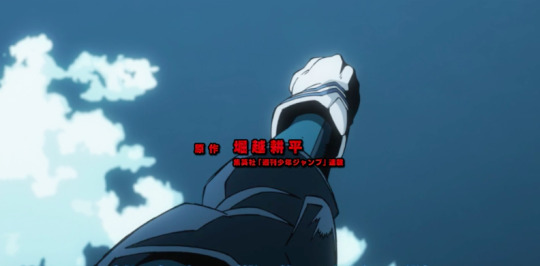
SORA NI UTAEBA! While the song in this intro is kinda meh to me, the visuals are amazing. I love the symbolism for all the events of the ep - tho not gonna lie, this core’s ED is better than the OP. Anyway tho, go punch that wall Deku!
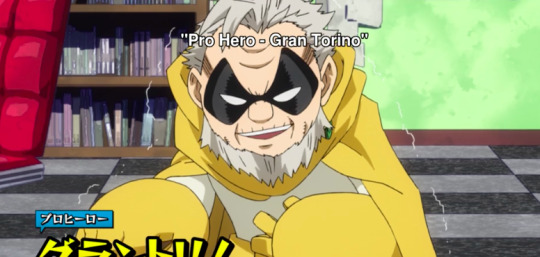
We start with Gran Torino pretending to be crazy. I’ll admit, I’m kinda eh on this bit, though I love Gran. It’s probably because I found it annoying when Yoda did it, so I find it annoying here as well. (It’s really just my inner fangirl talking. Nobody makes Deku unhappy except Kacchan. Who can get away with it.)

But actually, this sets up an interesting difference between Deku and Luke, though admittedly situation isn’t the same because Deku knows Gran is Gran. But Deku’s response to this is to call All Might to tell him Gran’s gone senile. He’s so empathetic Deku why aren’t you real? (no shade at Luke there,e I love him too. Just not as much).

“I don’t have time to mess around.” Deku did not come to play.

New costume! It’s incredible how much better it is than the old one. Like, not even funny how much better. Day-um, Deku.
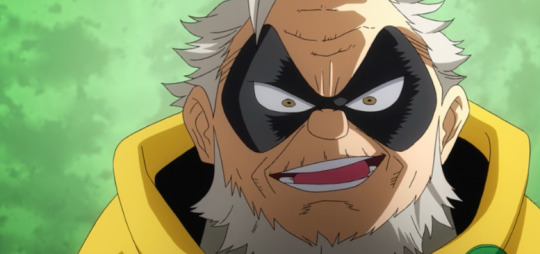
Pfh Gran knows exactly how to piss off Deku: Insult All Might. You clever little scoundrel.
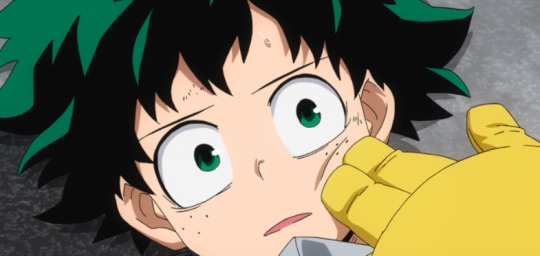
So onto Deku’s character flaws: 1. He’s overly analytical. Deku doesn’t know how to act quickly, partially due to circumstance, but partially that’s just how he is. Hesitant. Over-cautious, over-thinks things. He needs to learn how to take action - and in this arc, he does indeed do so without hesitation, and saves Iida’s life by so-doing. Box 1 checked off.
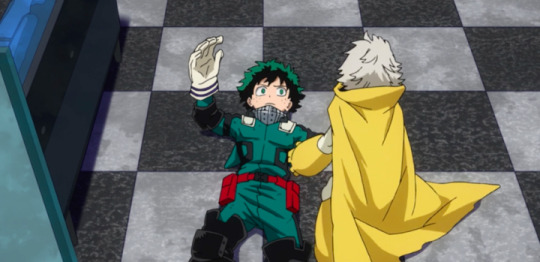
2. Deku admires All Might too much. Like every MC in BNHA, his Imitation is the Sincerest Form of Tragedy (insert me telling you to read that essay again). It’s a problem because he doesn’t believe in himself. So he needs to learn not to imitate All Might and be his own hero. That one doesn’t really sink in until the PLE arc. But check.
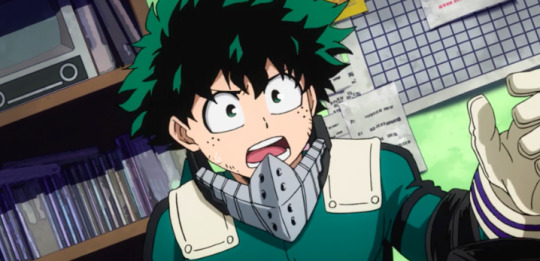
3. Deku is insecure. He has a massive inferiority complex (which fits nicely into his foil’s inf-sup complex, wouldn’t-cha-know) and doesn’t believe in himself. So he needs to learn to be more confident. (Is it wrong that I want this to end with him breaking through Instrumentality to a chorus of his friends saying ‘Congratulations’?)

Gran is my favorite Teacher, as a teacher, in BNHA. I’m a teaching-major, and I kinda aspire to his techniques. What I love the most is helping students figure it out themselves. Just telling someone the answer doesn’t help them. It’s so satisfying seeing a student make that breakthrough thanks to your guidance.
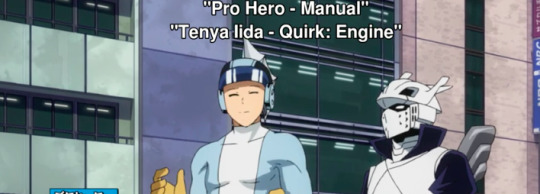
Now we’re cutting away to Iida’s internship to remind you Iida Wants Revenge. This is a little exposition-y, let’s cut somewhere else.
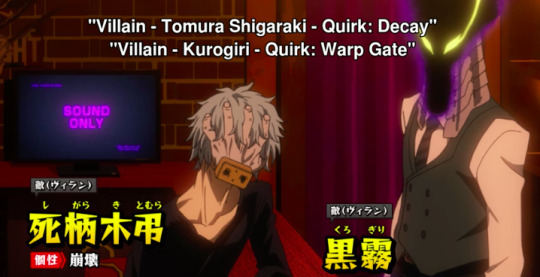
OK good, the villains! Right off the bat, we’ve got some great Parallels with the Heroes, as Tomura decides to basically Intern with a Pro-Villain. He even calls Stain a pro. Tho Tomura really needs to work on his recruitment strategy. “Stain join us. Cause.” “Bakugou. Join us. Cause”.

I want Deku and Tomura to build a grand Hero-Villain rivalry. Tomura basically hates him for no real reason right now, and I want there to be a good reason. Other than “He’s All Might’s successor”. I want them to be the Joker and Batman of BNHA with a real complex hero-villain rivalry, where one reflects the other. They’re getting there but I want more.

“Bloodlust without conviction is meaningless.” Ooh I love me some Stain. He really elevated this series’ philosophical side with his ramblings on heroism and villainy.
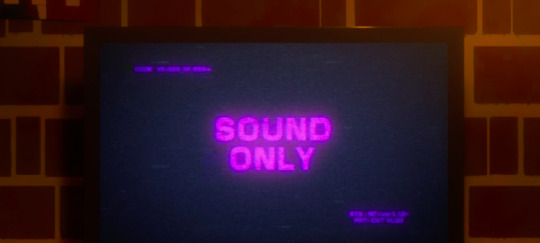
OK am I creeped out by the fact that All for One just said the same thing I did about learning? A little.

Deku is so brilliant and such a fast learner tho. It doesn’t take him long to put it all together. And Gran actually really admires him for that - I enjoy their mentor dynamic a lot, since Gran has some real respect for Midoriya in a different way from All Might.
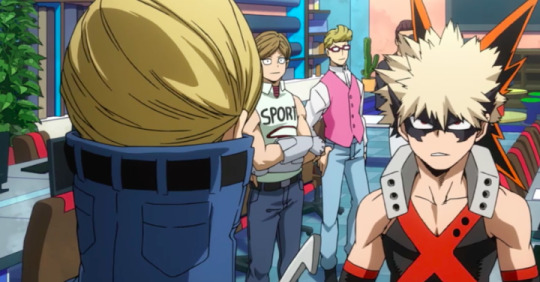
Bakugou with Best Jeanist! OMG the comedy gold of this. Though I just want to take a sec to gripe about a change from the manga to the anime: Manga! Bakugou does not charge at Best Jeanist and yell at him. He’s not dumb enough to try that on the #4 Pro Hero and his teacher. He sits still and listens to Jeanist’s lecture. The only Bakugo line here that’s from the manga is “Didn’t you make an offer for me?” This completely changes the way we perceive Bakugo in this scene, and in general. Bad change.
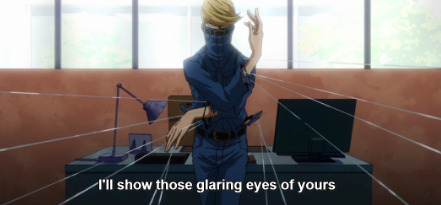
But in Good Storytelling-ville, I like the continuing parallels between the Wonder duo this creates: Izuku interns in a rundown neighborhood with an unlisted hero, Bakugo in Tokyo with a top pro. Izuku needs to learn to control his power and believe in himself. Katsuki needs to learn to be kinder and more humble. Izuku learns his lesson her, Katsuki doesn’t. Parallels!
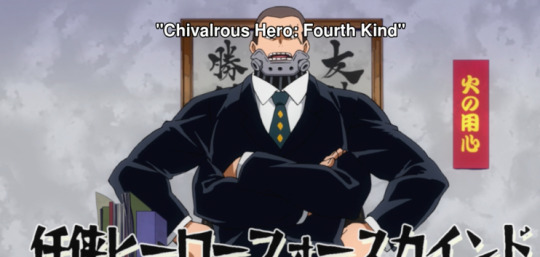
Kirishima and Tetsutetsu again! 4th kind is ok. He’s probably the least memorable of the internship pros, since his gimmick is simple and his design kinda dull.

Uraraka and Gunhead! I love how well they get along. He’s kawaii and she’s a hardcore badass. Don’t you forget it!

Now for more of Momo’s arc. The Uwabami internship is usually dismissed by fans as Just Fanservice, but think about it in context, and it becomes really interesting. One, the Hero Killer arc is about Stain protesting the commercialization of heroism, so we do need to have a Pro-Hero demonstrate the problematic nature of that commercialism. Uwabami does just that. Two, we need to have Momo’s internship be unfulfilling to her, to complete her downward trajectory (before the Final Exam arc can bring her back up), so it’s useful for further embarrassing and developing her character. 3, it sets up Momo and Kendo’s future rivalry.
I’ll take more about it in future eps where it appears.

Izuku practicing and constantly hitting his face on the wall is one of those things that makes me wonder if either a) he has a secret endurance quirk or b) OFA just naturally ups your durability. How does he still have a face after that.
Here’s a hot take: Izuku with his face smashed up from spending a night with no sleep training in garbage all night is still prettier than any other guy in this series.

One of the reviewers I follow made the comparison between All Might vs Deku’s using of OFA and Korra vs Aang’s role as the Avatar. You know, All Might and Korra, both master the power pretty quickly so they get to be strong fast but lose out on the spiritual connection a bit, while Deku and Aang take their time learning ofa/the four elements, but get as a tradeoff more of the spirit-y side...(ATLA & BNHA. My 2 favorite shows, alongside FMA. I swear these are like, three sides of the same show).

While I’m watching in the Sub this time around, i wanted to note a dub-ism in this scene: it’s localized to ‘hot pastries’ instead of taiyaki. There’s a lot of bits like that, where they take Japanese food and translate it for us dumb Americans. But well, maybe that made sense in the 90s, when there maybe wasn’t as much cultural crossover, but...even I knew what mochi were before watching BNHA (Uraraka’s fave, and the dub always localizes it to ‘sweets’) and everyone has google if they’re confused so why not just say ‘Taiyaki?’ Ah well, it’s a stupid nitpick but still.

Gran’s metaphor here is so great. As a teacher I aspire to learn from this man. Teach me your teaching ways.

“THIS TAIYAKI IS ME!!!!!” Another dub-ism has him say “I’m not really a dessert” I saw a reactor once comment on this ‘Yeah, but you are a snacc, Deku.’ I wholeheartedly agree.

FULL COWLLLLLLL!!!!!!! FYEAH!!!!!
OK so there are a lot of reasons I love Full Cowl. it’s one of the series’ finest moments, emblematic of what makes it cool. And what makes Deku cool. He’s smart, and has to work his way around problems, and this solution was just...it was there, for us and Izuku the whole time, to finally sit up and take notice of. It’s about applying power in a different way. About taking what you can do and doing the best you can with what you’ve got. A big central theme for the series.
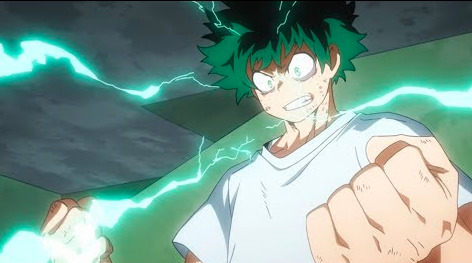
Also dayum that slow pan up Deku’s entire body as he activates it...he just looks good in this arc. Actually, post-cavalry battle Deku in the sports festival arc always looks weird and odd (because he’s beat up and in pain, duh) and prior to that he was mainly just adorable...this arc, however, is his official transition into Best Boy for Reals. He’s just...swoony. and also really cool, smart, and all sorts of great fangirl-y things.
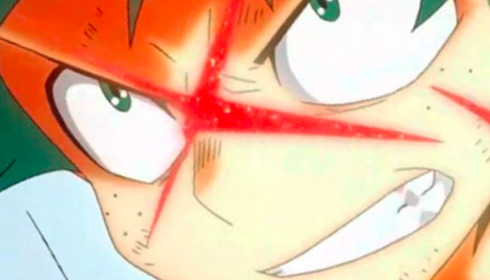
We end on a confident Deku smile and Daiki’s adorable ‘hai.’ Basically, i really enjoy this episode. A little slow at the beginning, maybe. But that conclusion is amazing and so worth the payoff. It’s even got this amazing rhyme and rhythm to it, cutting back and forth between the different students and teachers and just having themes echo between each other like poetry. It love it.
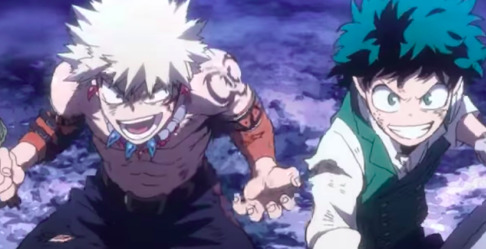
To close off: ED4, AKA BEST ED EVER!!!! This is seriously, no sarcasm, best ED. So for those of you who don’t know, the story behind ED4 Datte Atashi no Hero is, 1: The Fantasy AU theme comes from the second popularity poll, which came out around Chapter 120/Episode 61 (yes, THAT one) and for which Horikoshi drew the top 10 in fantasy garb. 2: The Song was written by LiSa and was explicitly stated by her to be effectively about Izuku’s feelings towards Kacchan. I wrote a post analyzing it. It is, basically, the anthem for...
BKDK CORNER

“Loose…” Guess who the first person Deku thinks of to create Full Cowling is? If you sad Kacchan, ding-ding-ding!
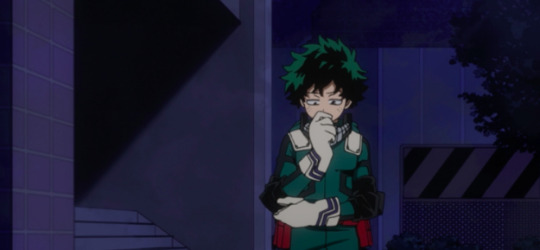

On an analytical note, I think it’s very, very significant that the first real breakthrough Deku makes in handling his power comes by observing Kacchan and imitating him. This is one of my Top 20 Favorite BKDK moments, even though it’s completely indirect, because of how important that is in the long-run. But what about the Imitation theme? Why is it OK for Izuku to imitate Katsuki, but not All Might? Well, first of all, he does use Gran Torino’s moves as well, but mainly, I think the series is saying with this distinction that it’s OK to imitate someone if you see their flaws and acknowledge them, but if you hero-worship them and see them as perfect, you’re only going to screw yourself over. This is why Iida imitating Ingenium, Shoto imitating his mom, Deku and Kacchan imitating All Might, and yes, Uraraka imitating Deku, are all so bad for them. If you see someone as perfect, and want to imitate them, you’ll never achieve that in your mind, because you already view yourself as imperfect. So Deku can imitate Katsuki because he thinks he’s a jerk, but also an amazing fighter, and Gran because he thinks he’s weird, but tough.
Also Deku just automatically thinking of Kacchan first is so damn shippy.
BEST GIRL OF THE EPISODE: Uwabami!
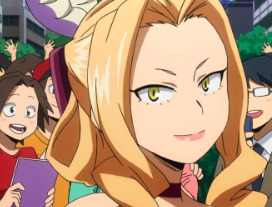
RANKER: Ranking the Internship Pros, least helpful to most.
10. Uwabami
9. Mt. Lady
8. 4th Kind
7. Endeavor
6. Death Arms
5. Manual
4. Selkie and Sirius (anime only)
3. Gunhead
2. Best Jeanist
1. Gran Torino! (Deku lucked out)
#my hero academia#episode 27#season 2 episode 14#bizarre gran torino appears#midoriya izuku#gran torino#katsuki bakugou#momo yaoyorozu#katsudeku#bakudeku#be prepared for lots of gushing#my deku bias is strong with this one#everyone has their fave#i'm glad mine's the mc#sometimes anyway#come s5 he's gonna be like#barely around for a whole damn season#anyway so glad to be at the Hero Killer arc#let's go!
16 notes
·
View notes